Recap of Major Milestones from 1991 On
1996
Message from the President
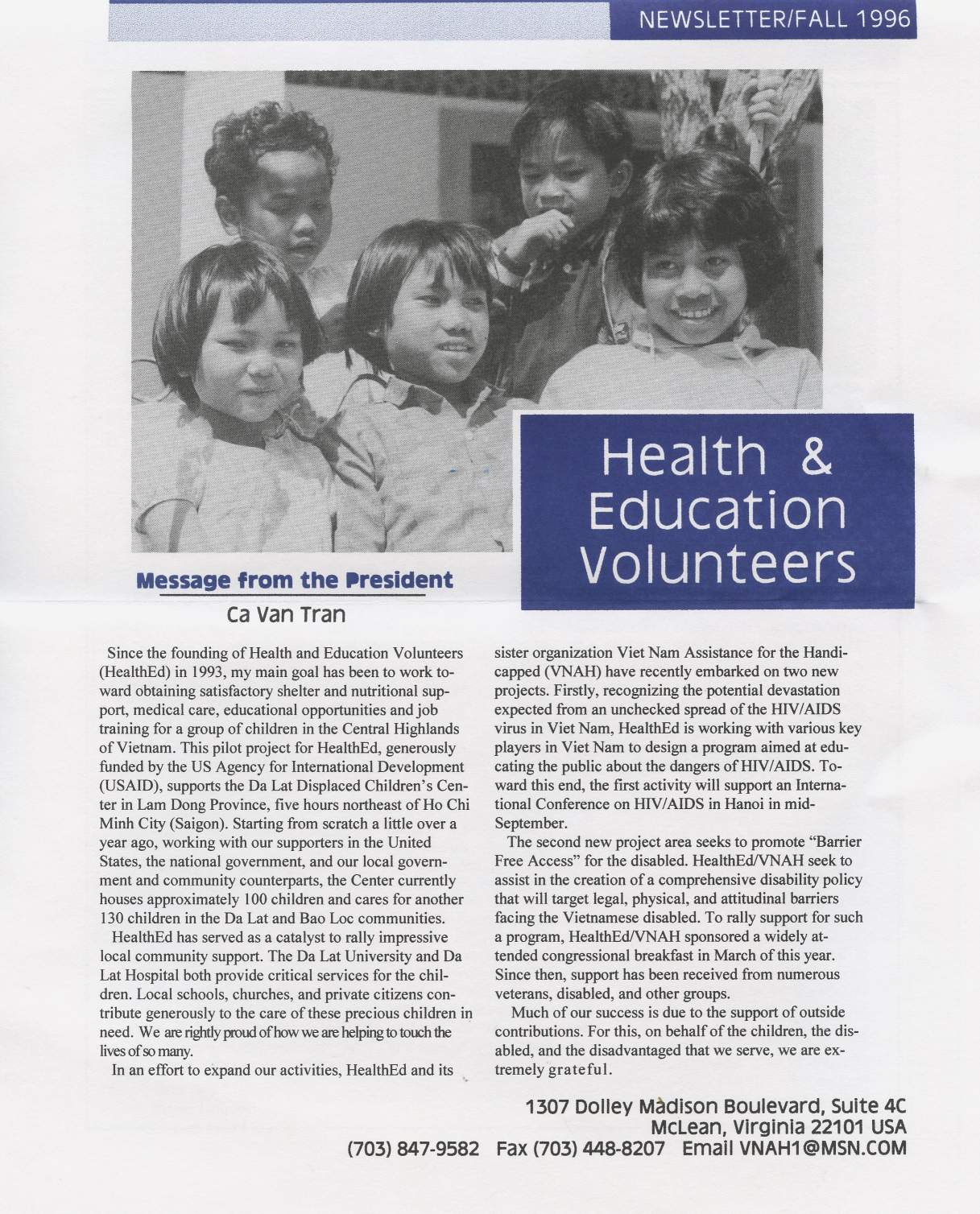
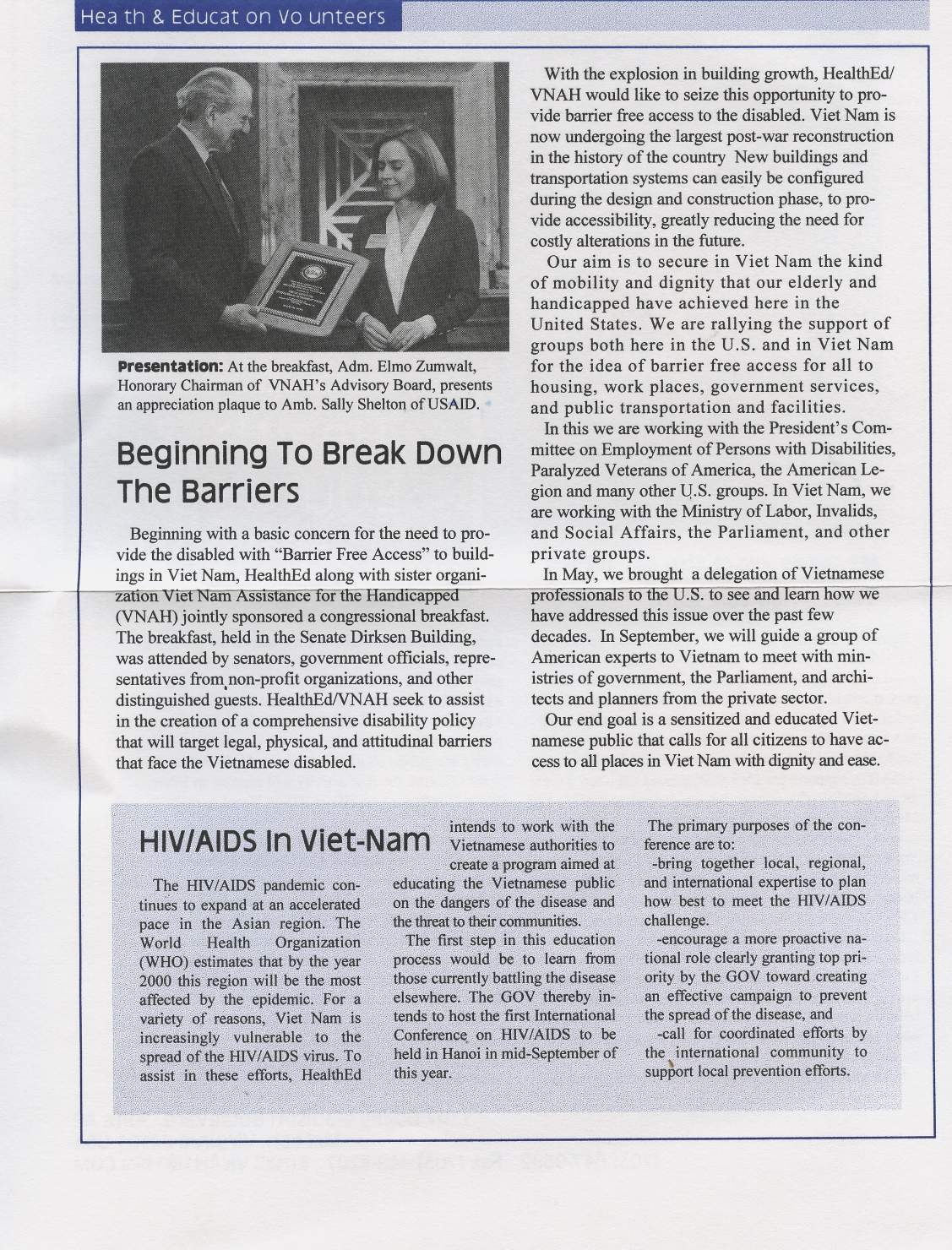
Newsletter / Fall 1996
Beginning To Break Down The Barriers
With the explosion in building growth, HealthEd/VNAH would like to seize this opportunity to provide barrier free access to the disabled. Viet Nam is now undergoing the largest post-war reconstruction in the history of the country. New buildings and transportation systems can easily be configured during the design and construction phase, to provide accessibility, greatly reducing the need for costly alterations in the future.
Our aim is to secure in Viet Nam the kind of mobility and dignity that our elderly and handicapped have achieved here in the United States. We are rallying the support of groups both here in the U.S. and in Viet Nam for the idea of barrier free access for all to housing, work places, government services, and public transportation and facilities.
In this we are working with the President’s Committee on Employment of Persons with Disabilities, Paralyzed Veterans of America, the American Legion and many other U.S. groups. In Viet Nam, we are working with the Ministry of Labor, Invalids, and Social Affairs, the Parliament, and other private groups.
In May, we brought a delegation of Vietnamese professionals to the U.S. to see and learn how we have addressed this issue over the past two decades. In September, we will guide a group of American experts to Vietnam to meet with ministries of government, the Parliament, and architects and planners from the private sector.
Our end goal is a sensitized and educated Vietnamese public that calls for all citizens to have access to all places in Viet Nam with dignity and ease.
---
HIV/AIDS In Viet-Nam
The HIV/AIDS pandemic continues to expand at an accelerated pace in the Asian region. The World Health Organization (WHO) estimates that by the year 2000 this region will be the most affected by the epidemic. For a variety of reasons, Viet Nam is increasingly vulnerable to the spread of the HIV/AIDS virus. To assist in these efforts, HealthEd intends to work with the Vietnamese authorities to create a program aimed at educating the Vietnamese public on the dangers of the disease and the threat to their communities.
The first step in this education process would be to learn from those currently battling the disease elsewhere. The GOV thereby intends to host the first International Conference on HIV/AIDS to be held in Hanoi in mid-September of this year.
The primary purposes of the conference are to:
- bring together local, regional, and international expertise to plan how best to meet the HIV/AIDS challenge.
- encourage a more proactive national role clearly granting top priority by the GOV toward creating an effective campaign to prevent the spread of the disease, and
- call for coordinated efforts by the international community to support local prevention efforts.
---
Message from the President
Ca Van Tran
Since the founding of Health and Education Volunteers (HealthEd) in 1993, my main goal has been to work toward obtaining satisfactory shelter and nutritional support, medical care, educational opportunities and job training for a group of children in the Central Highlands of Vietnam. This pilot project for HealthEd, generously funded by the US Agency for International Development (USAID), supports the Da Lat Displaced Children’s Center in Lam Dong Province, five hours northeast of Ho Chi Minh City (Saigon). Starting from scratch a little over a year ago, working with our supporters in the United States, the national government, and our local government and community counterparts, the Center currently houses approximately 100 children and cares for another 130 children in the Da Lat and Bao Loc communities.
HealthEd has served as a catalyst to rally impressive local community support. The Da Lat University and Da Lat Hospital both provide critical services for the children. Local schools, churches, and private citizens continue generously to care for the needs of these precious children in need. We are rightly proud of how we are helping to touch the lives of so many.
In an effort to expand our activities, HealthEd and its sister organization Viet Nam Assistance for the Handicapped (VNAH) have recently embarked on two new projects. Firstly, recognizing the potential devastation expected from an unchecked spread of the HIV/AIDS virus in Viet Nam, HealthEd is working with various key players in Viet Nam to design a program aimed at educating the public about the dangers of HIV/AIDS. Toward this end, the first activity will support an International Conference on HIV/AIDS in Hanoi in mid-September.
The second new project area seeks to promote “Barrier Free Access” for the disabled. HealthEd/VNAH seek to assist in the creation of a comprehensive disability policy that will target legal, physical, and attitudinal barriers facing the Vietnamese disabled. To rally support for such a program, HealthEd/VNAH sponsored a widely attended congressional breakfast in March of this year. Since then, support has been received from numerous veterans, disabled, and other groups.
Much of our success is due to the support of outside contributions. For this, on behalf of the children, the disabled, and the disadvantaged that we serve, we are extremely grateful.
---
Contact Information:
Health & Education Volunteers
1307 Dolley Madison Boulevard, Suite 4C
McLean, Virginia 22101 USA
(703) 847-9582
Fax (703) 448-8207
Email VNAH1@MSN.COM
---
Summer 2003
Outreach Mission: Reaching Out to Needy Amputees in Rural Areas
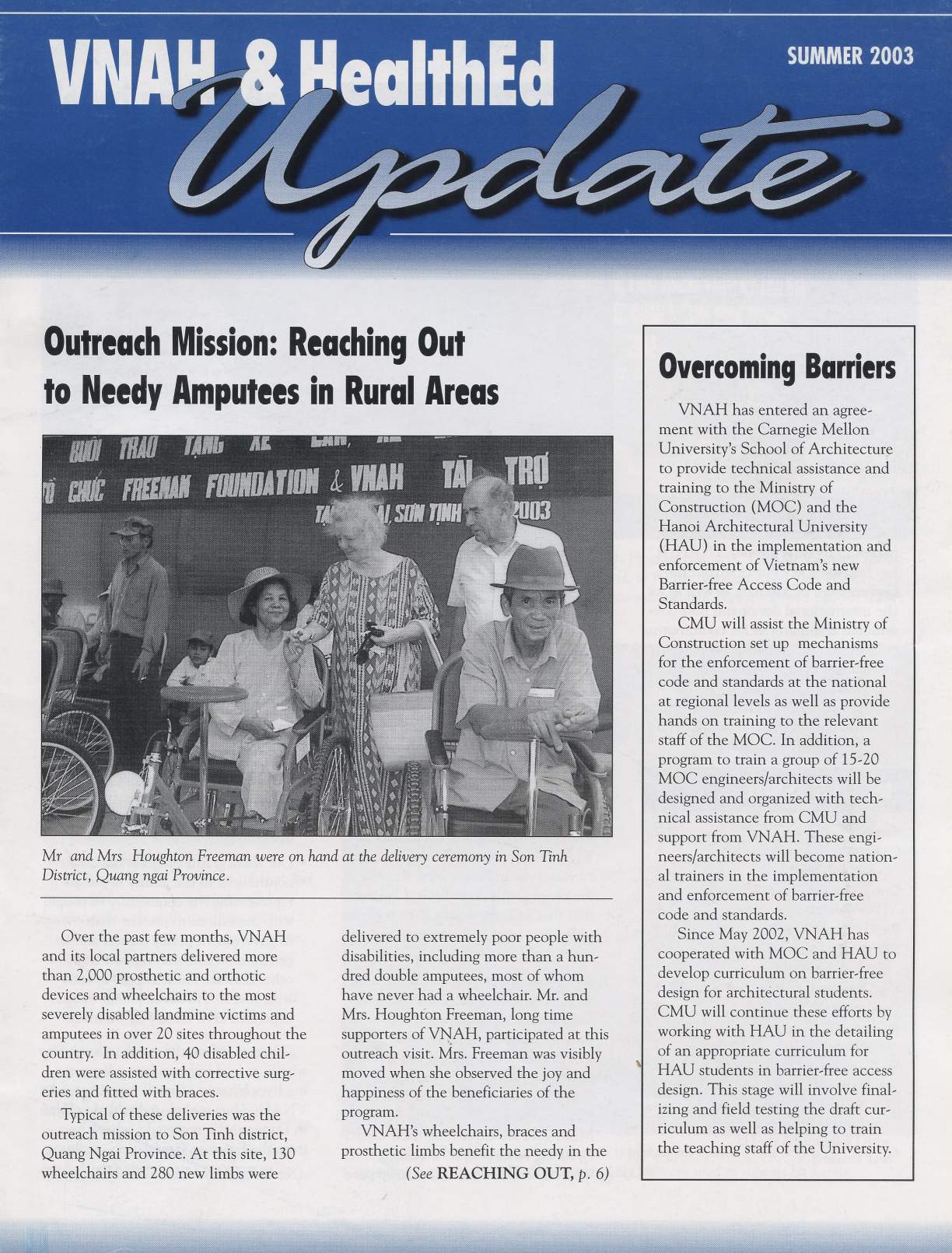
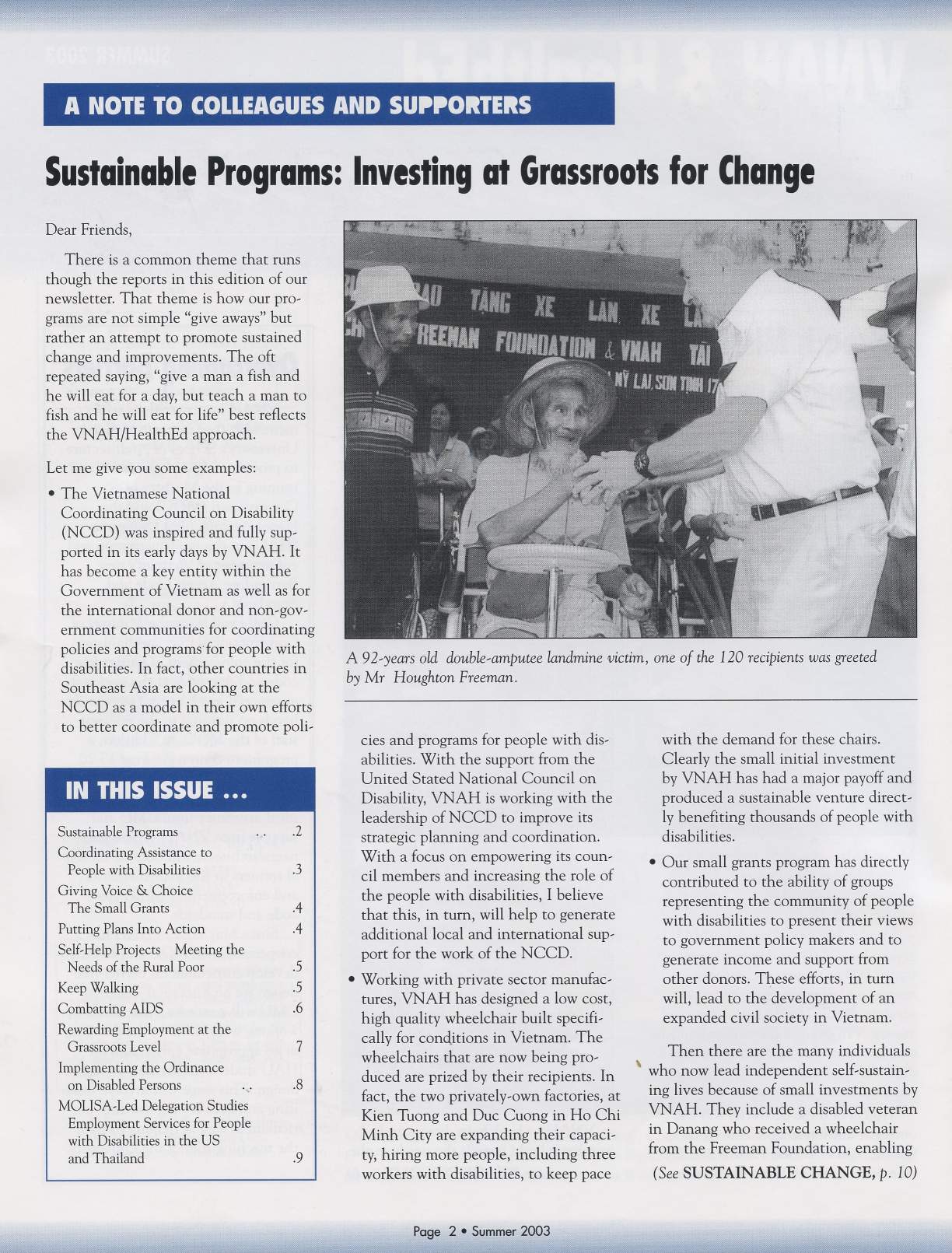
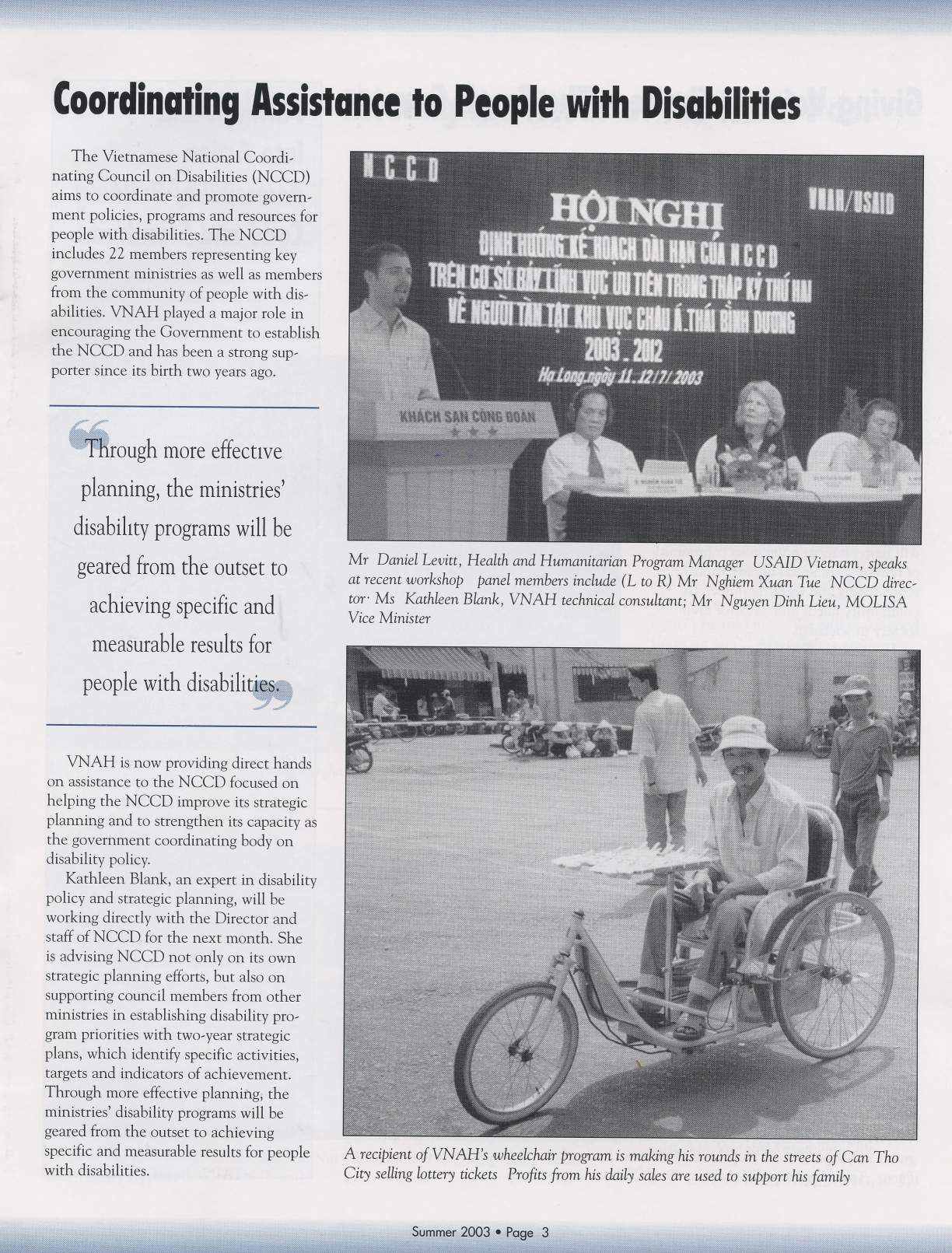
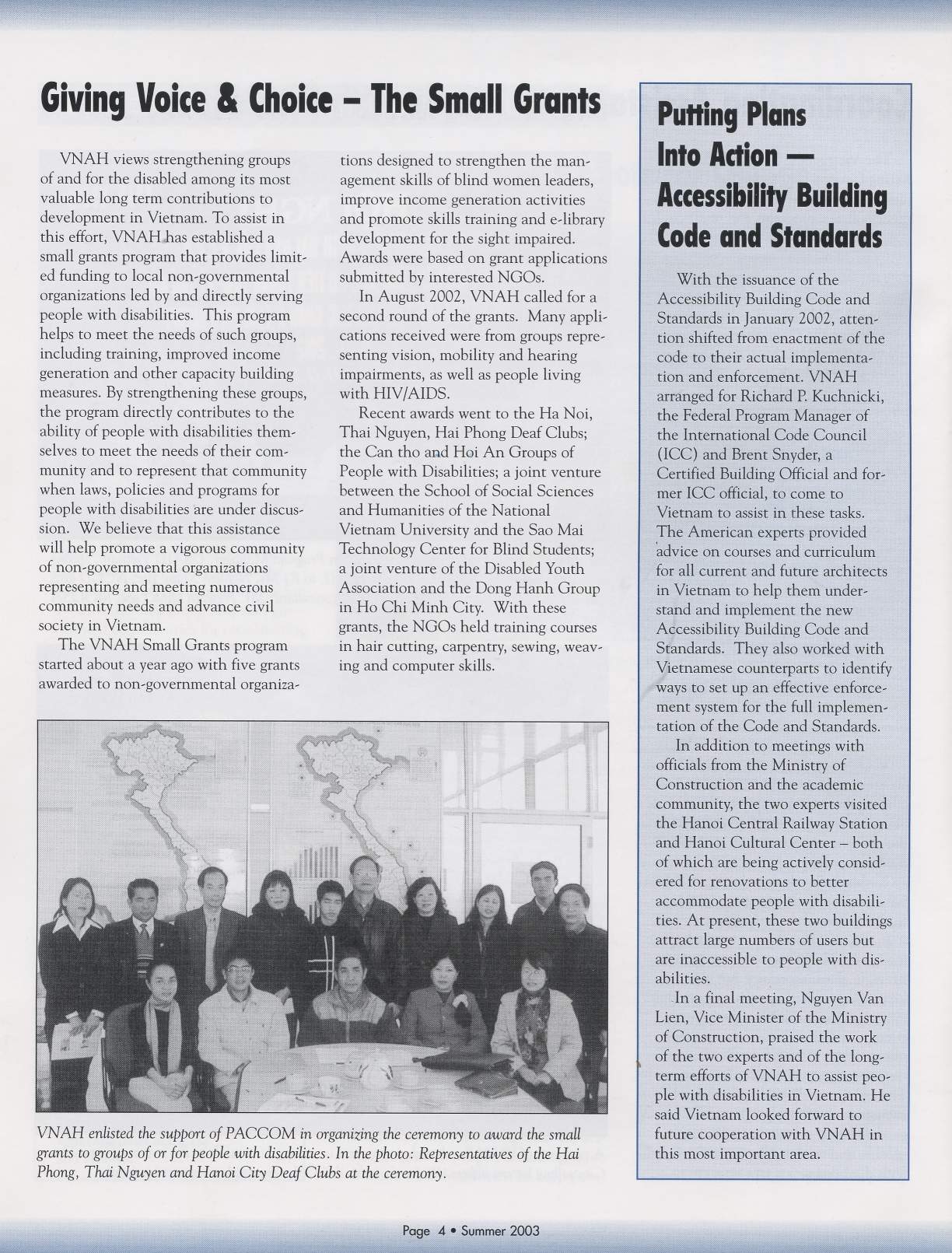
VNAH & HealthEd Update
SUMMER 2003
Outreach Mission: Reaching Out to Needy Amputees in Rural Areas
Mr and Mrs Houghton Freeman were on hand at the delivery ceremony in Son Tinh District, Quang ngai Province.
Over the past few months, VNAH and its local partners delivered more than 2,000 prosthetic and orthotic devices and wheelchairs to the most severely disabled landmine victims and amputees in over 20 sites throughout the country. In addition, 40 disabled children were assisted with corrective surgeries and fitted with braces.
Typical of these deliveries was the outreach mission to Son Tinh district, Quang Ngai Province. At this site, 130 wheelchairs and 280 new limbs were delivered to extremely poor people with disabilities, including more than a hundred double amputees, most of whom have never had a wheelchair. Mr. and Mrs. Houghton Freeman, long time supporters of VNAH, participated at this outreach visit. Mrs. Freeman was visibly moved when she observed the joy and happiness of the beneficiaries of the program.
VNAH’s wheelchairs, braces and prosthetic limbs benefit the needy in the (See REACHING OUT, p. 6)
Overcoming Barriers
VNAH has entered an agreement with the Carnegie Mellon University's School of Architecture to provide technical assistance and training to the Ministry of Construction (MOC) and the Hanoi Architectural University (HAU) in the implementation and enforcement of Vietnam’s new Barrier-free Access Code and Standards.
CMU will assist the Ministry of Construction set up mechanisms for the enforcement of barrier-free code and standards at the national and regional levels as well as provide hands on training to the relevant staff of the MOC. In addition, a program to train a group of 15-20 MOC engineers/architects will be designed and organized with technical assistance from CMU and support from VNAH. These engineers/architects will become national trainers in the implementation and enforcement of barrier-free code and standards.
Since May 2002, VNAH has cooperated with MOC and HAU to develop curriculum on barrier-free design for architectural students. CMU will continue these efforts by working with HAU in the detailing of an appropriate curriculum for HAU students in barrier-free access design. This stage will involve finalizing and field testing the draft curriculum as well as helping to train the teaching staff of the University.
A NOTE TO COLLEAGUES AND SUPPORTERS
Sustainable Programs: Investing at Grassroots for Change
Dear Friends,
There is a common theme that runs though the reports in this edition of our newsletter. That theme is how our programs are not simple “give aways” but rather an attempt to promote sustained change and improvements. The oft repeated saying, “give a man a fish and he will eat for a day, but teach a man to fish and he will eat for life” best reflects the VNAH/HealthEd approach.
Let me give you some examples:
- The Vietnamese National Coordinating Council on Disability (NCCD) was inspired and fully supported in its early days by VNAH. It has become a key entity within the Government of Vietnam as well as for the international donor and non-government communities for coordinating policies and programs for people with disabilities. In fact, other countries in Southeast Asia are looking at the NCCD as a model in their own efforts to better coordinate and promote policies and programs for people with disabilities. With the support from the United Stated National Council on Disability, VNAH is working with the leadership of NCCD to improve its strategic planning and coordination. With a focus on empowering its council members and increasing the role of the people with disabilities, I believe that this, in turn, will help to generate additional local and international support for the work of the NCCD.
- Working with private sector manufacturers, VNAH has designed a low cost, high quality wheelchair built specifically for conditions in Vietnam. The chairs are donated to new recipients. In fact, the two privately-owned factories, Kien Tuong and Duc Cuong in Ho Chi Minh City are expanding their capacity, hiring more people, including three workers with disabilities, to keep pace with the demand for these chairs. Clearly the small initial investment by VNAH has had a major payoff and produced a sustainable venture directly benefiting thousands of people with disabilities.
- Our small grants program has directly contributed to the ability of groups representing the community of people with disabilities to present their views to government policy makers and to generate income and support from other donors. These efforts, in turn, will lead to the development of an expanded civil society in Vietnam.
Then there are the many individuals who have benefited from wheelchair donations and subsequent self-sustain programs initiated and supported by VNAH. They include a disabled veteran in Danang who received a wheelchair from the Freeman Foundation, enabling (See SUSTAINABLE CHANGE, p. 10)
A 92-years old double-amputee landmine victim, one of the 120 recipients was greeted by Mr Houghton Freeman.
Coordinating Assistance to People with Disabilities
The Vietnamese National Coordinating Council on Disabilities (NCCD) aims to coordinate and promote government policies, programs and resources for people with disabilities. The NCCD includes 22 members representing key government ministries as well as members from the community of people with disabilities. VNAH played a major role in encouraging the Government to establish the NCCD and has been a strong supporter since its birth two years ago.
"Through more effective planning, the ministries’ disability programs will be geared from the outset to achieving specific and measurable results for people with disabilities."
VNAH is now providing direct hands on assistance to the NCCD focused on helping the NCCD improve its strategic planning and to strengthen its capacity as the government coordinating body on disability policy. Kathleen Blank, an expert in disability policy and strategic planning, will be working directly with the Director and staff of NCCD for the next month. She is advising NCCD not only on its own strategic planning efforts, but also on supporting council members from other ministries in establishing disability program priorities with two-year strategic plans, which identify specific activities, targets and indicators of achievement. Through more effective planning, the ministries’ disability programs will be geared from the outset to achieving specific and measurable results for people with disabilities.
Mr Daniel Levitt, Health and Humanitarian Program Manager USAID Vietnam, speaks at recent workshop panel members include (L to R) Mr Nghiem Xuan Tue NCCD director; Ms Kathleen Blank, VNAH technical consultant; Mr Nguyen Dinh Lieu, MOLISA Vice Minister
A recipient of VNAH's wheelchair program is making his rounds in the streets of Can Tho City selling lottery tickets. Profits from his daily sales are used to support his family
Giving Voice & Choice - The Small Grants
VNAH views strengthening groups of and for the disabled among its most valuable long term contributions to development in Vietnam. To assist in this effort, VNAH has established a small grants program that provides limited funding to local non-governmental organizations led by and directly serving people with disabilities. This program helps to meet the needs of such groups, including training, improved income generation and other capacity building measures. By strengthening these groups, the program directly contributes to the ability of people with disabilities themselves to meet the needs of their community and to represent that community in advocating for more effective laws, policies and programs for their own welfare and greater inclusion in society. This program will help promote the development of non-governmental organizations that represent and serve the community needs in Vietnam.
The VNAH Small Grants program started about a year ago with five grants awarded to non-governmental organizations designed to strengthen the management skills of blind women leaders, improve income generation activities and promote skills training and e-library development for the sight impaired. Awards were based on grant applications submitted by interested NGOs.
In August 2002, VNAH called for a second round of the grants. Many applications received were from groups representing vision, mobility and hearing impairments, as well as people living with HIV/AIDS.
Recent awards went to the Ha Noi, Thai Nguyen, Hai Phong Deaf Clubs; the Can tho and Hoi An Groups of People with Disabilities; a joint venture between the School of Social Sciences and Humanities of the National Vietnam University and the Sao Mai Technology Center for Blind Students; a joint venture of the Disabled Youth Association and the Dong Hanh Group in Ho Chi Minh City. With these grants, the NGOs held training courses in hair cutting, carpentry, sewing, weaving and computer skills.
VNAH enlisted the support of PACCOM in organizing the ceremony to award the small grants to groups of for people with disabilities. In the photo: Representatives of the Hai Phong, Thai Nguyen and Hanoi City Deaf Clubs at the ceremony.
Putting Plans Into Action - Accessbility Building Code and Standards
With the issuance of the Accessibility Building Code and Standards in January 2002, attention shifted from enactment of the code to the actual implementation and enforcement. VNAH arranged for Richard P. Kucabnick, the Federal Program Manager of the International Code Council (ICC) and Brent Snyder, a Certified Building Official and a member ICC official, to come to Vietnam to assist in these tasks. The American experts provided advice on courses and curriculum and worked with future architects in Vietnam to help them better understand the enforcement needs of the new building code and standards. They also worked with Vietnamese counterparts to identify ways to set up an effective enforcement system for the full implementation of the Code and Standards.
In addition to meetings with officials from the Ministry of Construction and the academic community, the two experts visited the Hanoi Central Railway Station and Hanoi Cultural Center – both of which are being actively considered for renovations to better accommodate people with disabilities. At present, these two buildings attract large numbers of users but are inaccessible to people with disabilities.
In a final meeting, Nguyen Van Lien, Vice Minister of the Ministry of Construction, praised the work of the two experts and of the longterm efforts of VNAH to assist people with disabilities in Vietnam. He said Vietnam looked forward to future cooperation with VNAH in this most important area.
2004
VNAH Works to Boost Disability Programs in Viet Nam's National Agenda
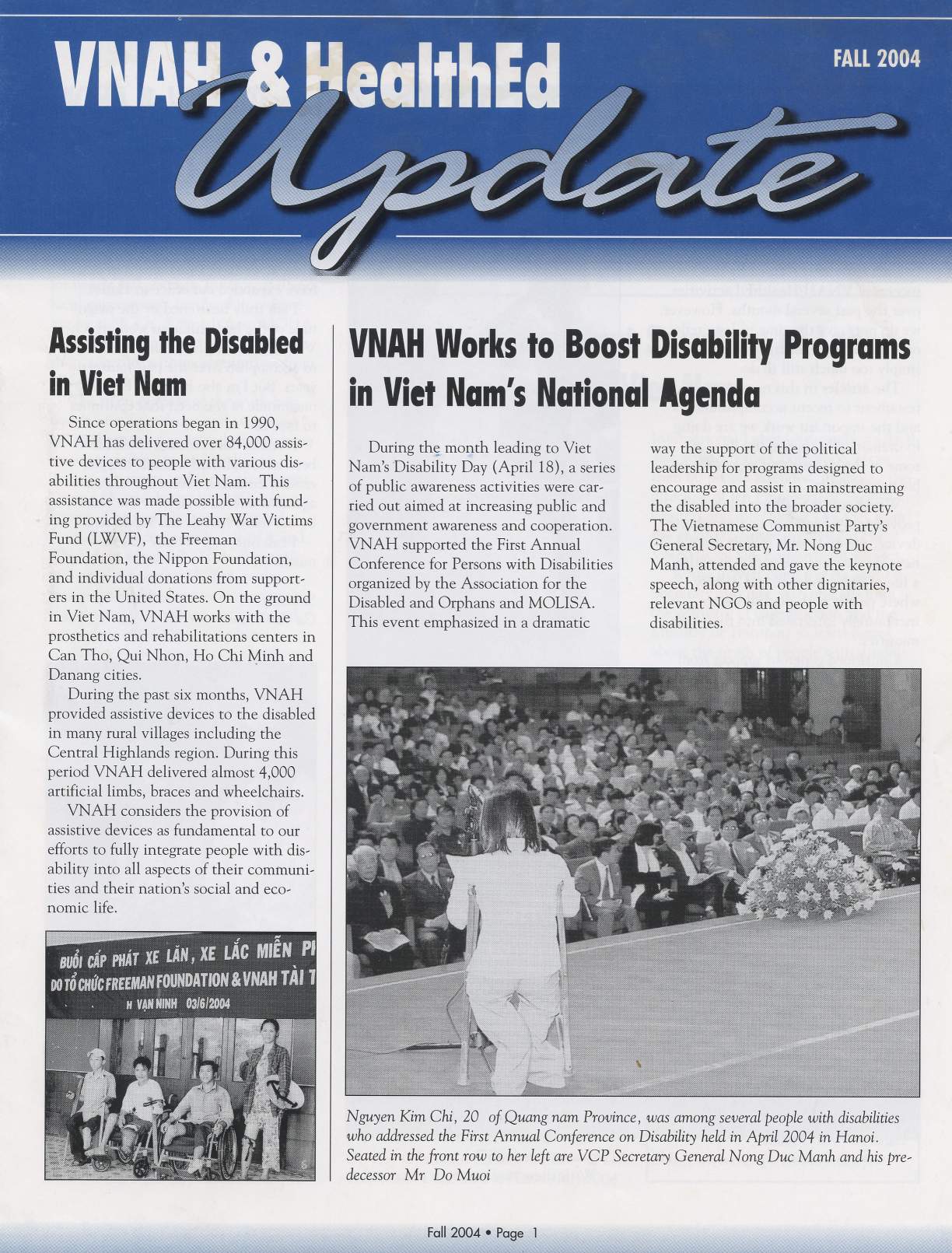
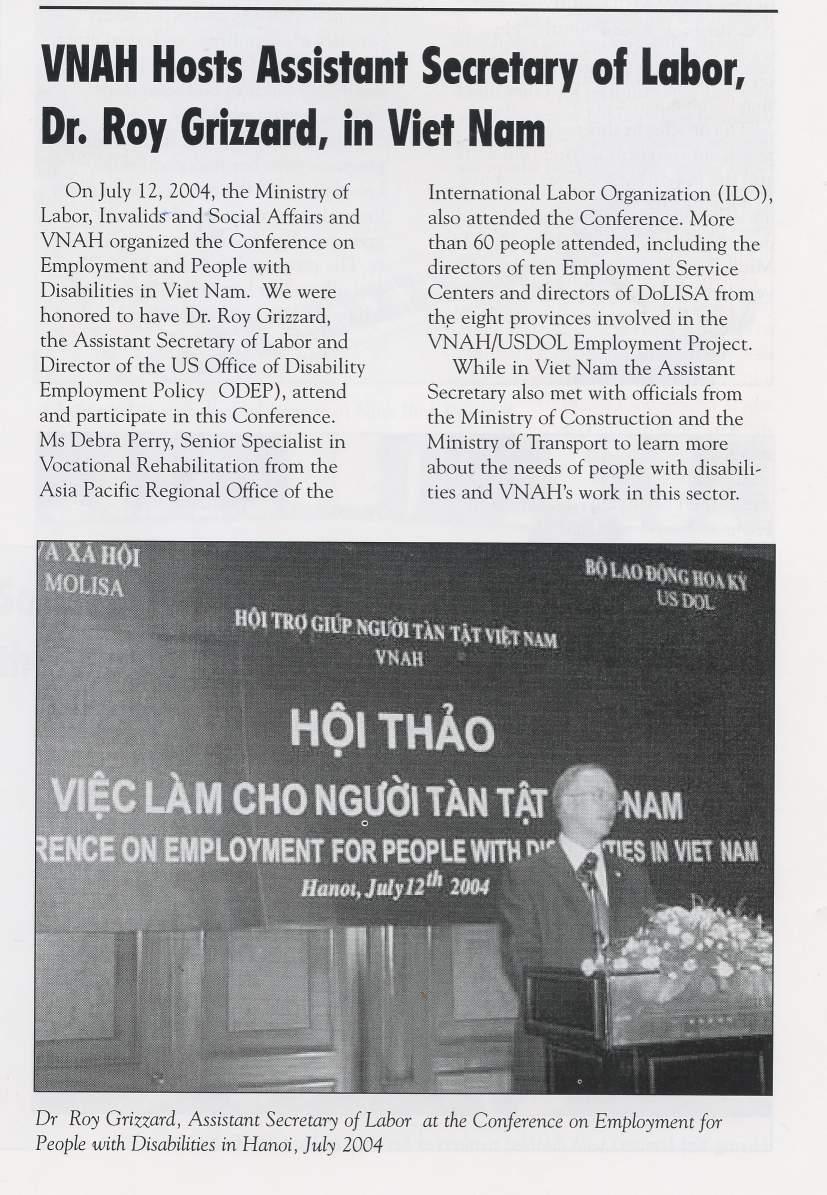
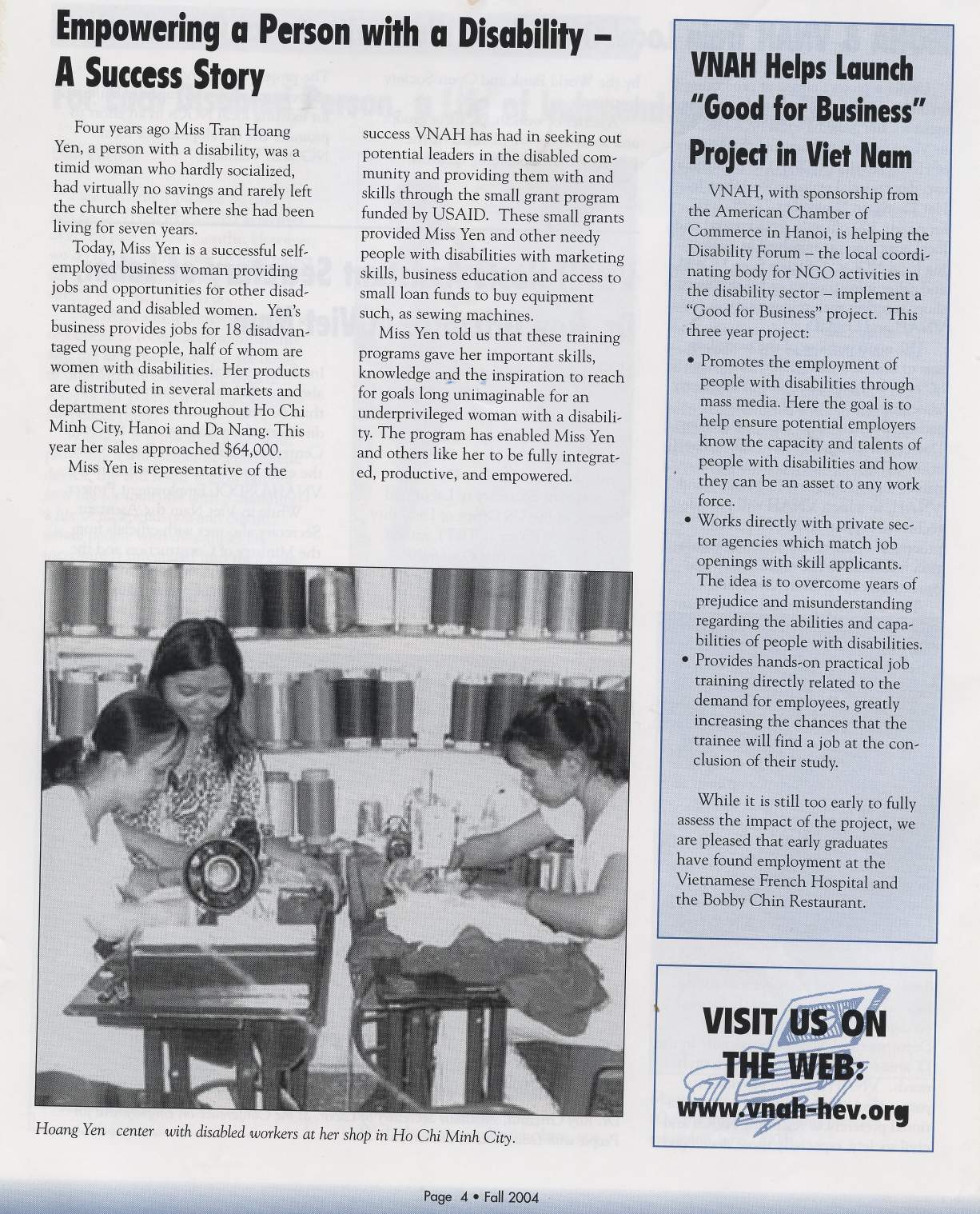
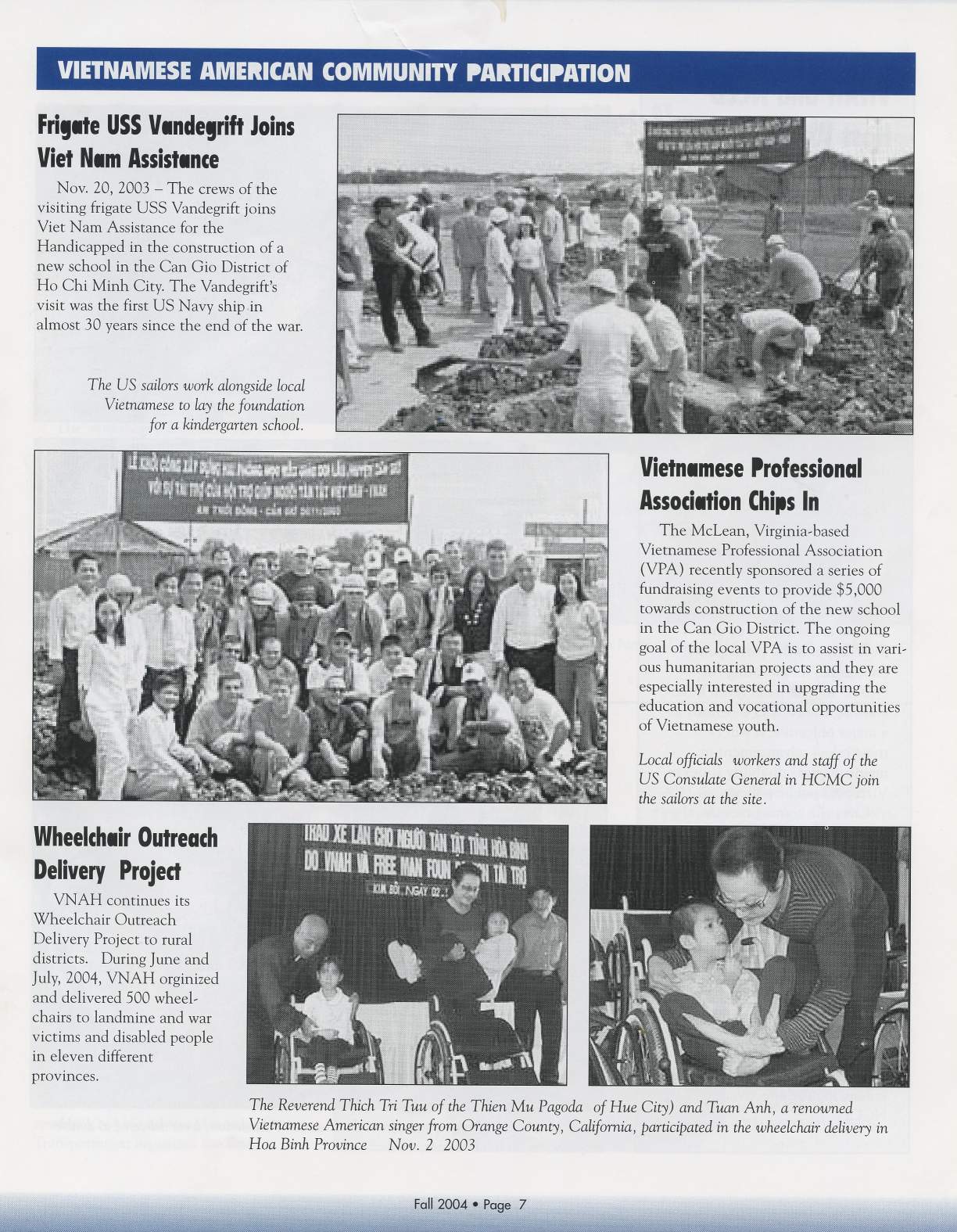
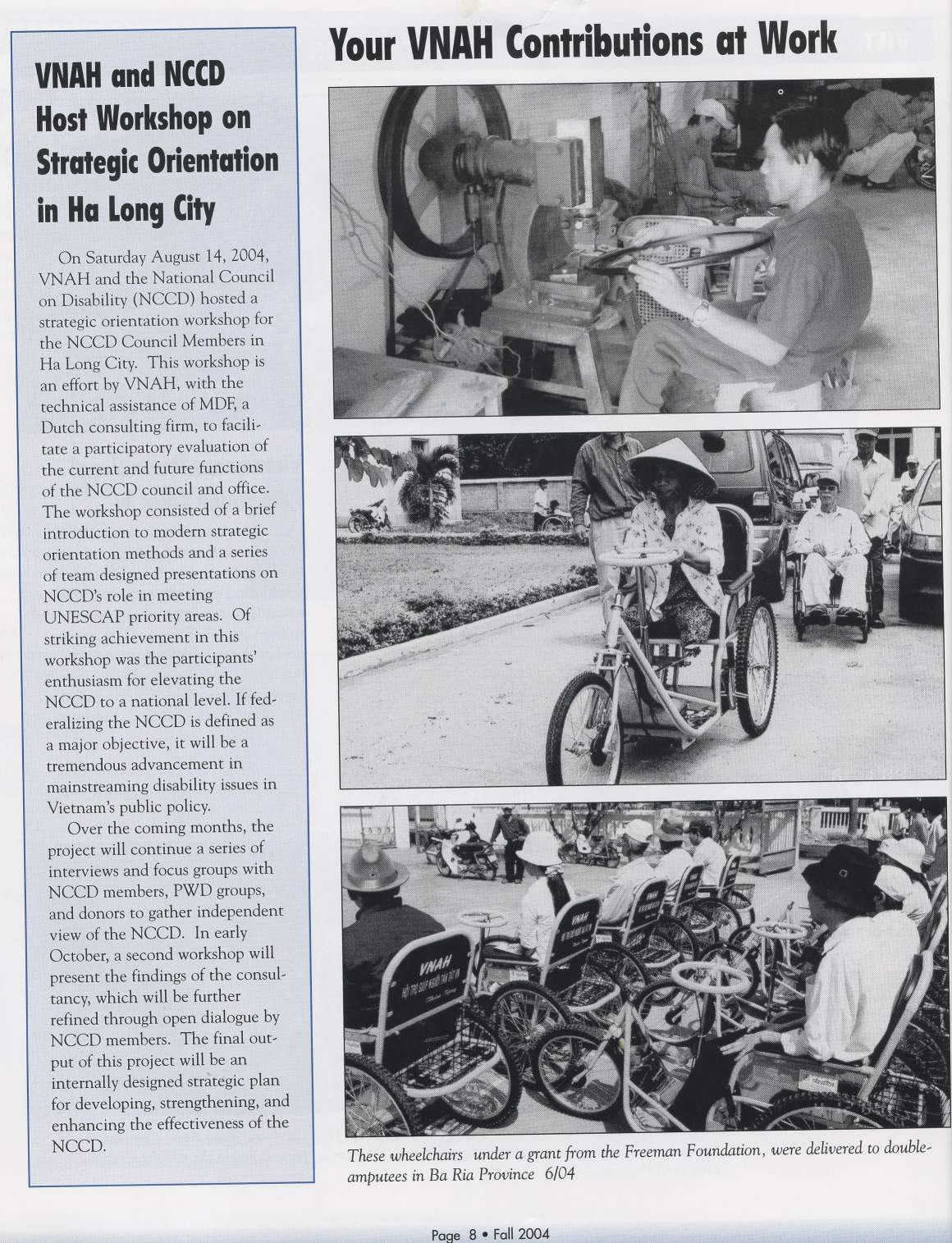
Assisting the Disabled in Viet Nam
Since operations began in 1990, VNAH has delivered over 84,000 assistive devices to people with various disabilities throughout Viet Nam. This assistance was made possible with funding provided by the Leahy War Victims Fund (LWVF), the Freeman Foundation, the Nippon Foundation, and individual donations from supporters in the United States. On the ground in Viet Nam, VNAH works with the prosthetics and rehabilitations centers in Can Tho, Qui Nhon, Ho Chi Minh and Danang cities.
During the past six months, VNAH provided assistive devices to the disabled in many rural villages including the Central Highlands region. During this period VNAH delivered almost 4,000 artificial limbs, braces and wheelchairs.
VNAH considers the provision of assistive devices as fundamental to our efforts to fully integrate people with disability into all aspects of their communities and their nation's social and economic life.
VNAH Works to Boost Disability Programs in Viet Nam's National Agenda
During the month leading to Viet Nam's Disability Day (April 18), a series of public awareness activities were carried out aimed at increasing public and government awareness and cooperation. VNAH supported the First Annual Conference for Persons with Disabilities organized by the Association for the Disabled and Orphans and MOLISA. This event emphasized in a dramatic way the support of the political leadership for programs designed to encourage and assist in mainstreaming the disabled into the broader society. The Vietnamese Communist Party's General Secretary. Mr. Nong Duc Manh, attended and gave the keynote speech, along with other dignitaries, relevant NGOs and people with disabilities.
Nguyen Kim Chi, 20 of Quang Nam Province, was among several people with disabilities who addressed the First Annual Conference on Disability held in April 2004 in Hanoi. Seated in the front row to her left are VCP Secretary General Nong Duc Manh and his predecessor Mr Do Muoi.
VNAH Hosts Assistant Secretary of Labor, Dr. Roy Grizzard, in Viet Nam
On July 12, 2004, the Ministry of Labor, Invalids and Social Affairs and VNAH organized the Conference on Employment and People with Disabilities in Viet Nam. We were honored to have Dr. Roy Grizzard, the Assistant Secretary of Labor and Director of the US Office of Disability Employment Policy (ODEP), attend and participate in this Conference. Ms Debra Perry, Senior Specialist in Vocational Rehabilitation from the Asia Pacific Regional Office of the International Labor Organization (ILO), also attended the Conference. More than 60 people attended, including the directors of ten Employment Service Centers and directors of DoLISA from the eight provinces involved in the VNAH/USDOL Employment Project.
While in Viet Nam the Assistant Secretary also met with officials from the Ministry of Construction and the Ministry of Transport to learn more about the needs of people with disabilities and VNAH's work in the sector.
Dr. Roy Grizzard, Assistant Secretary of Labor at the Conference on Employment for People with Disabilities in Hanoi, July 2004
Empowering a Person with a Disability - A Success Story
Four years ago Miss Tran Hoang Yen, a person with a disability, was a timid woman who hardly socialized, had virtually no savings and rarely left the church shelter where she had been living for seven years.
Today, Miss Yen is a successful self-employed business woman providing jobs and opportunities for other disadvantaged and disabled women. Yen's business provides jobs for 18 disadvantaged young people, half of whom are women with disabilities. Her products are distributed in several markets and department stores throughout Ho Chi Minh City, Hanoi and Da Nang. This year her sales approached $64,000.
Miss Yen is representative of the success VNAH has had in seeking out potential leaders in the disabled community and providing them with and skills through the small grant program funded by USAID. These small grants provided Miss Yen and other needy people with disabilities with marketing skills, business education and access to small loan funds to buy equipment such as sewing machines.
Miss Yen told us that these training programs gave her important skills, knowledge and the inspiration to reach for goals long unimaginable for an underprivileged woman with a disability. The program has enabled Miss Yen and others like her to be fully integrated, productive, and empowered.
Hoang Yen center with disabled workers at her shop in Ho Chi Minh City.
VNAH Helps Launch "Good for Business" Project in Viet Nam
VNAH, with sponsorship from the American Chamber of Commerce in Hanoi, is helping the Disability Forum - the local coordinating body for NGO activities in the disability sector - implement a "Good for Business" project. This three year project:
- Promotes the employment of people with disabilities through mass media. Here the goal is to help ensure potential employers know the capacity and talents of people with disabilities and how they can be an asset to any work force.
- Works directly with private sector agencies which match job openings with skill applicants. The idea is to overcome years of prejudice and misunderstanding regarding the abilities and capabilities of people with disabilities.
- Provides hands-on practical job training directly related to the demand for employees, greatly increasing the chances that the trainee will find a job at the conclusion of their study.
While it is still too early to fully assess the impact of the project, we are pleased that early graduates have found employment at the Vietnamese French Hospital and the Bobby Chinn Restaurant.
VISIT US ON
THE WEB:
www.vnai-hev.org
Frigate USS Vandegrift Joins Viet Nam Assistance
Nov. 20, 2003 - The crews of the visiting frigate USS Vandegrift joins Viet Nam Assistance for the Handicapped in the construction of a new school in the Can Gio District of Ho Chi Minh City. The Vandegrift's visit was the first US Navy ship in almost 30 years since the end of the war.
The US sailors work alongside local Vietnamese to lay the foundation for a kindergarten school.
Vietnamese Professional Association Chips In
The McLean, Virginia-based Vietnamese Professional Association (VPA) recently sponsored a series of fundraising events to provide $5,000 towards construction of the new school in the Can Gio District. The ongoing goal of the local VPA is to assist in various humanitarian projects and they are especially interested in upgrading the education and vocational opportunities of Vietnamese youth.
Local officials workers and staff of the US Consulate General in HCMC join the sailors at the site.
Wheelchair Outreach Delivery Project
VNAH continues its Wheelchair Outreach Delivery Project to rural districts. During June and July, 2004, VNAH organized and delivered 500 wheel-chairs to landmine and war victims and disabled people in eleven different provinces.
The Reverend Thich Tri Tuu of the Thien Mu Pagoda of Hue City and Tuan Anh, a renowned Vietnamese American singer from Orange County, California, participated in the wheelchair delivery in Hoa Binh Province Nov. 2 2003
VNAH and NCCD Host Workshop on Strategic Orientation in Ha Long City
On Saturday August 14, 2004, VNAH and the National Council on Disability (NCCD) hosted a strategic orientation workshop for the NCCD Council Members in Ha Long City. This workshop is an effort by VNAH, with the technical assistance of MDF, a Dutch consulting firm, to facilitate a participatory evaluation of the current and future functions of the NCCD council and office. The workshop consisted of a brief introduction to modern strategic orientation methods and a series of team designed presentations on NCCD's role in meeting UNESCAP priority areas. Of striking achievement in this workshop was the participants' enthusiasm for elevating the NCCD to a national level. It federalizing the NCCD is defined as a major objective, it will be a tremendous advancement in mainstreaming disability issues in Vietnam's public policy.
Over the coming months, the project will continue a series of interviews and focus groups with NCCD members, PWD groups, and donors to gather independent view of the NCCD. In early October, a second workshop will present the findings of the consultancy, which will be further refined through open dialogue by NCCD members. The final output of the project will be an internally designed strategic plan for developing, strengthening, and enhancing the effectiveness of the NCCD.
Your VNAH Contributions at Work
These wheelchairs under a grant from the Freeman Foundation, were delivered to double-amputees in Ba Ria Province 6/04
2005
Outreach Missions Expand to Assist Amputees in Remote Rural Areas
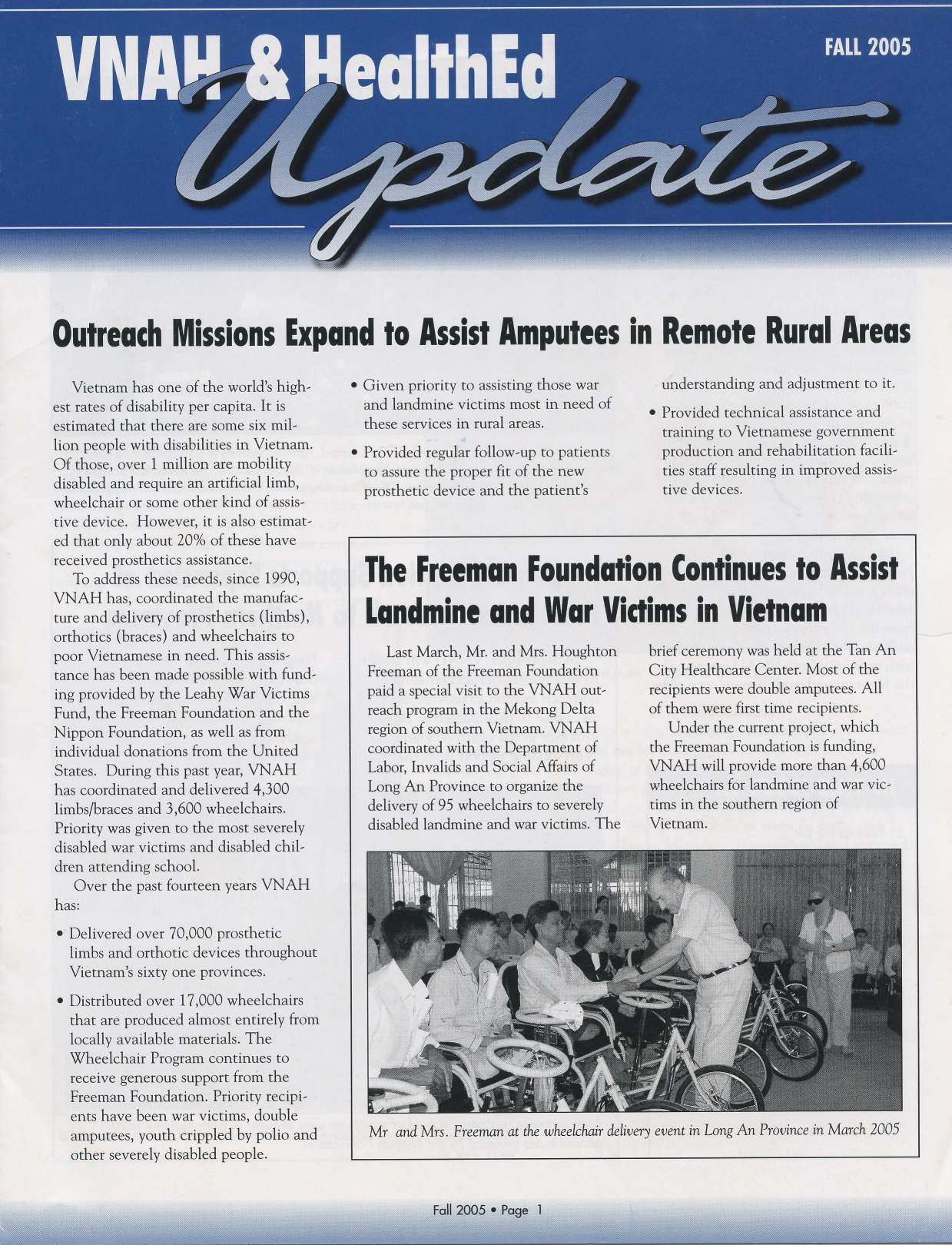
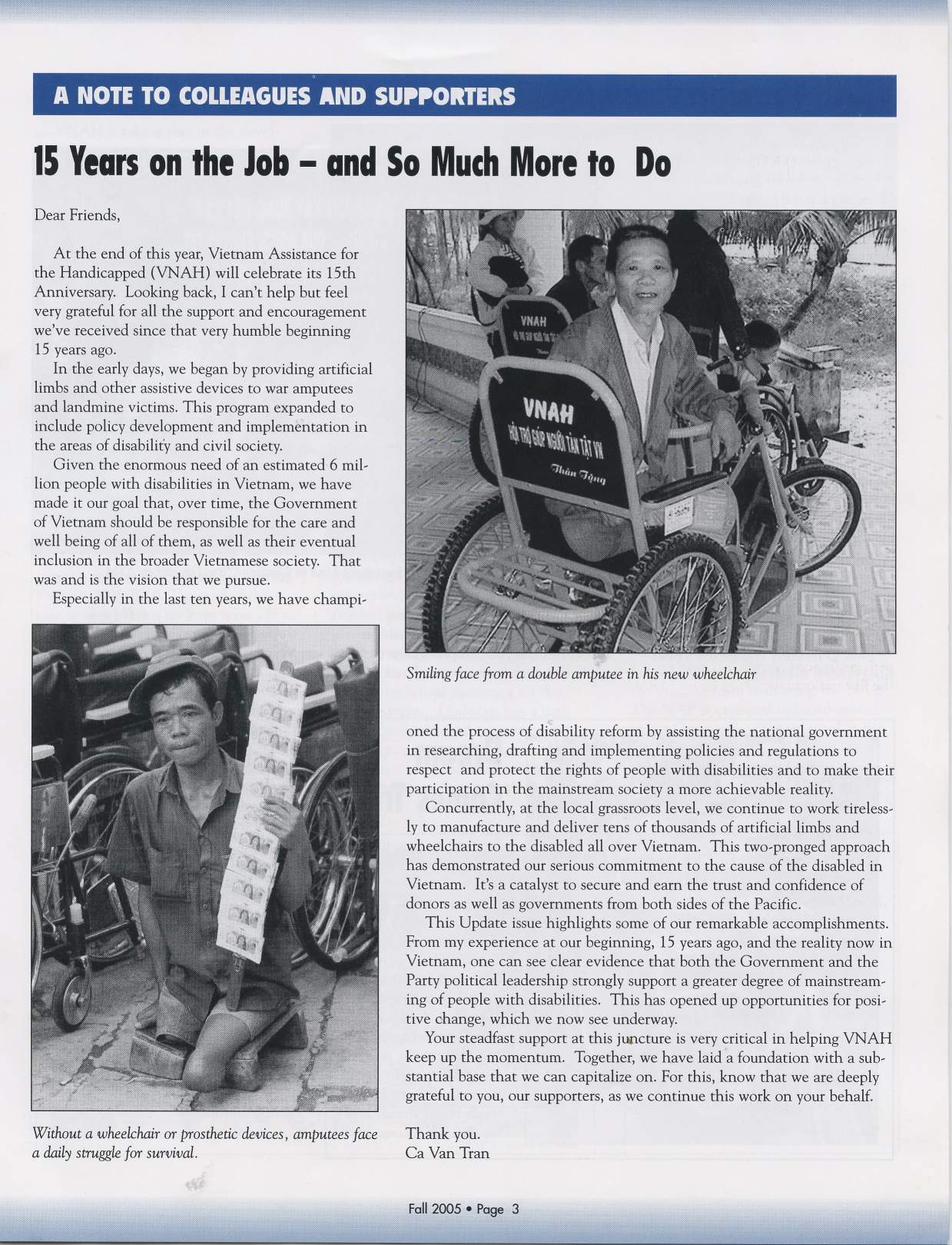
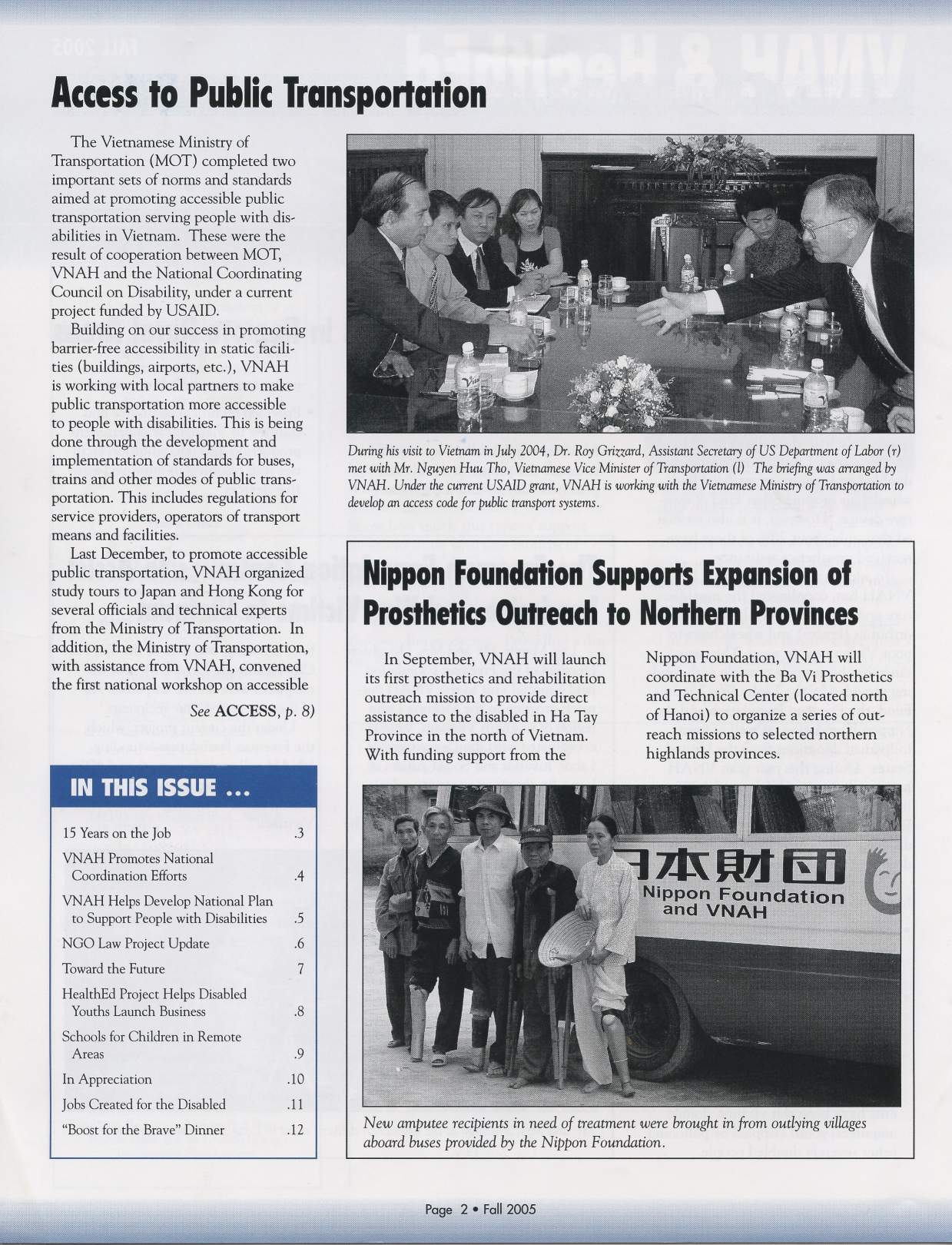
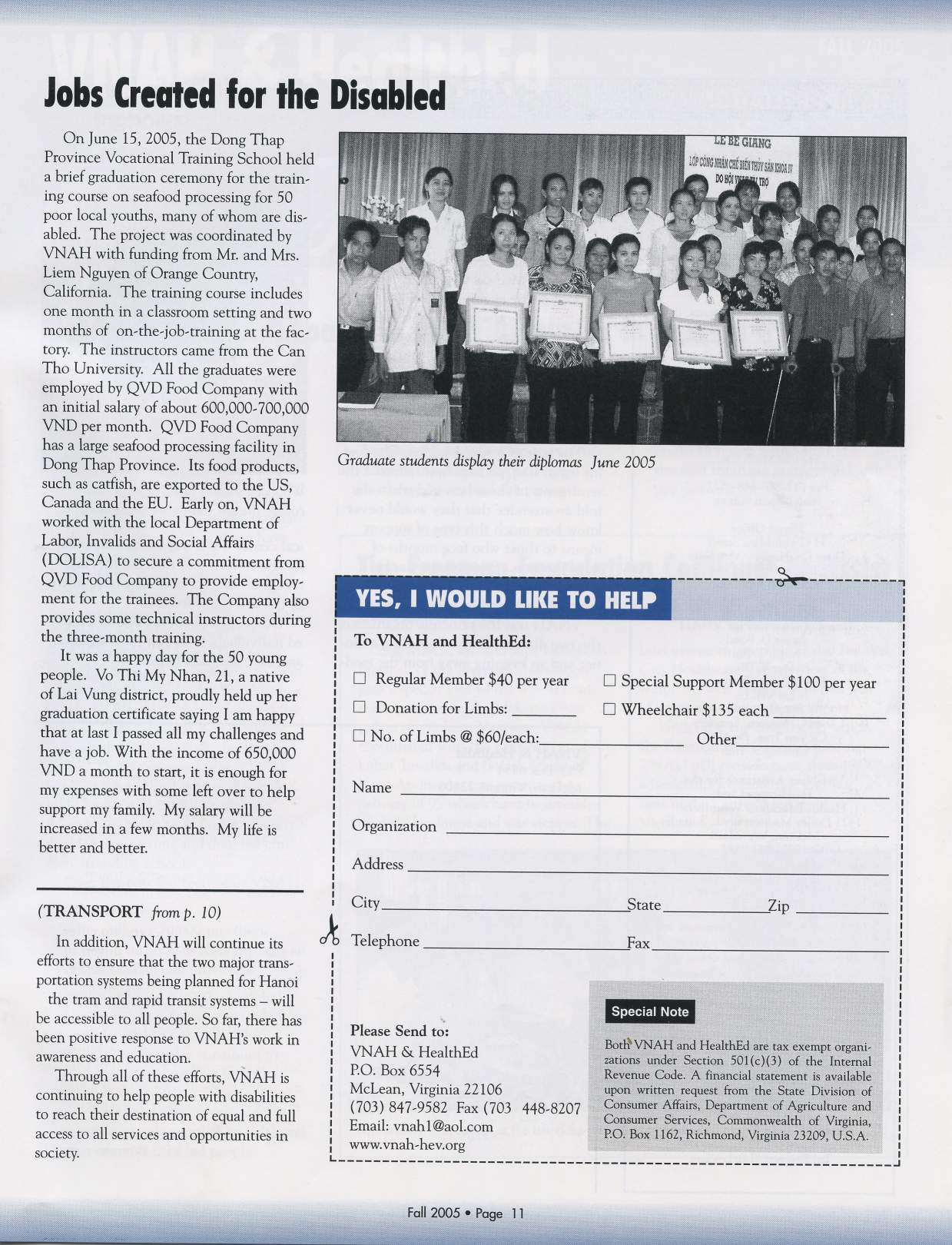
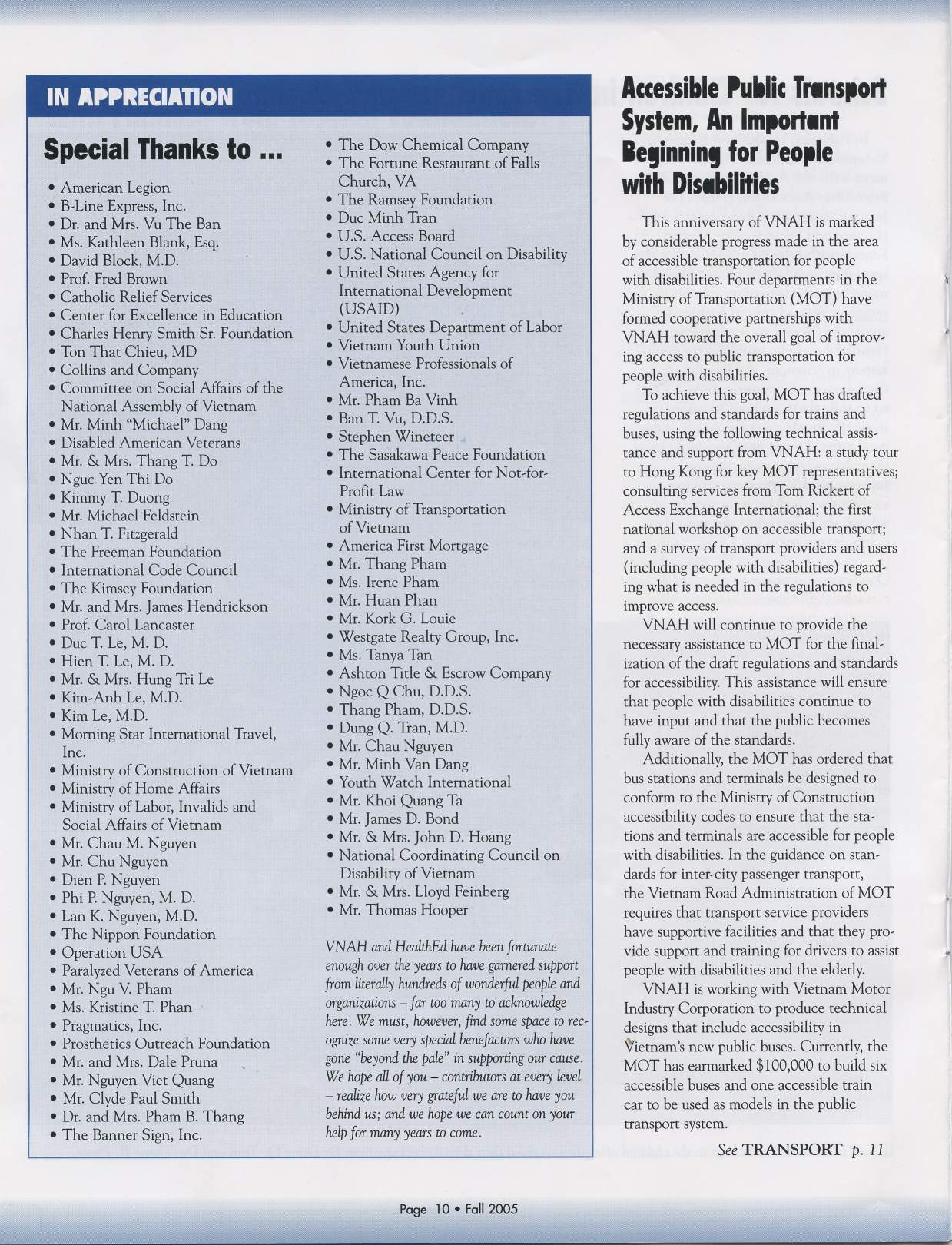
Outreach Missions Expand to Assist Amputees in Remote Rural Areas
Vietnam has one of the world's highest rates of disability per capita. It is estimated that there are some six million people with disabilities in Vietnam. Of those, over 1 million are mobility disabled and require an artificial limb, wheelchair, or some other kind of assistive device. However, it is also estimated that only about 20% of these have received prosthetic assistance.
To address these needs, since 1990, VNAH has coordinated the manufacture and delivery of prosthetics (limbs), orthotics (braces), and wheelchairs to poor Vietnamese in need. This assistance has been made possible with funding provided by the Leahy War Victims Fund, the Freeman Foundation and the Nippon Foundation, as well as from individual donations from the United States. During this past year, VNAH has coordinated and delivered 4,300 limbs/braces and 3,600 wheelchairs. Priority was given to the most severely disabled war victims and disabled children attending school.
Over the past fourteen years VNAH has:
- Delivered over 70,000 prosthetic limbs and orthotic devices throughout Vietnam's sixty one provinces.
- Distributed over 17,000 wheelchairs that are produced almost entirely from locally available materials. The Wheelchair Program continues to receive generous support from the Freeman Foundation. Priority recipients have been war victims, double amputees, youth crippled by polio and other severely disabled people.
- Given priority to assisting those war and landmine victims most in need of these services in rural areas.
- Provided regular follow-up to patients to assure the proper fit of the new prosthetic device and the patient’s understanding and adjustment to it.
- Provided technical assistance and training to Vietnamese government production and rehabilitation facilities staff resulting in improved assistive devices.
The Freeman Foundation Continues to Assist Landmine and War Victims in Vietnam
Last March, Mr. and Mrs. Houghton Freeman of the Freeman Foundation paid a special visit to the VNAH outreach program in the Mekong Delta region of southern Vietnam. VNAH coordinated with the Department of Labor, Invalids and Social Affairs of Long An Province to organize the delivery of 95 wheelchairs to severely disabled landmine and war victims. The brief ceremony was held at the Tan An City Healthcare Center. Most of the recipients were double amputees. All of them were first-time recipients.
Under the current project, which the Freeman Foundation is funding, VNAH will provide more than 4,600 wheelchairs for landmine and war victims in the southern region of Vietnam.
Mr. and Mrs. Freeman at the wheelchair delivery event in Long An Province in March 2005
A NOTE TO COLLEAGUES AND SUPPORTERS
15 Years on the Job – and So Much More to Do
Dear Friends,
At the end of this year, Vietnam Assistance for the Handicapped (VNAH) will celebrate its 15th Anniversary. Looking back, I can't help but feel very grateful for all the support and encouragement we've received since that very humble beginning 15 years ago.
In the early days, we began by providing artificial limbs and other assistive devices to war amputees and landmine victims. This program expanded to include policy development and implementation in the areas of disability and civil society.
Given the enormous need of an estimated 6 million people with disabilities in Vietnam, we have made it our goal that, over time, the Government of Vietnam should be responsible for the care and well-being of all of them, as well as their eventual inclusion in the broader Vietnamese society. That was and is the vision that we pursue.
Especially in the last ten years, we have championed the process of disability reform by assisting the national government in researching, drafting and implementing policies and regulations to respect and protect the rights of people with disabilities and to make their participation in the mainstream society a more achievable reality.
Concurrently, at the local grassroots level, we continue to work tirelessly to manufacture and deliver tens of thousands of artificial limbs and wheelchairs to the disabled all over Vietnam. This two-pronged approach has demonstrated our serious commitment to the cause of the disabled in Vietnam. It's a catalyst to secure and earn the trust and confidence of donors as well as governments from both sides of the Pacific.
This Update issue highlights some of our remarkable accomplishments. From my experience at our beginning, 15 years ago, and the reality now in Vietnam, one can see clear evidence that both the Government and the Party political leadership strongly support a greater degree of mainstreaming of people with disabilities. This has opened up opportunities for positive change, which we now see underway.
Your steadfast support at this juncture is very critical in helping VNAH keep up the momentum. Together, we have laid a foundation with a substantial base that we can capitalize on. For this, know that we are deeply grateful to you, our supporters, as we continue this work on your behalf.
Thank you.
Ca Van Tran
Smiling face from a double amputee in his new wheelchair
Without a wheelchair or prosthetic devices, amputees face a daily struggle for survival.
Access to Public Transportation
The Vietnamese Ministry of Transportation (MOT) completed two important sets of norms and standards aimed at promoting accessible public transportation serving people with disabilities in Vietnam. These were the result of cooperation between MOT, VNAH and the National Coordinating Council on Disability, under a current project funded by USAID.
Building on our success in promoting barrier-free accessibility in static facilities (buildings, airports, etc.), VNAH is working with local partners to make public transportation more accessible to people with disabilities. This is being done through the development and implementation of standards for bus stations and other nodes of public transportation. This includes regulations for service providers, types of transport means and facilities.
Last December, to promote accessible public transportation, VNAH organized study tours to Japan, Thailand and Hong Kong, bringing with it several officials and technical experts from the Ministry of Transportation. In addition, the Ministry of Transportation, with assistance from VNAH, convened the first national workshop on accessible transport.
See ACCESS, p. 8
IN THIS ISSUE …
15 Years on the Job .......................................... 3
VNAH Promotes National Coordination Efforts .... 4
VNAH Helps Develop National Plan to Support People with Disabilities ................................... 5
NGO Law Project Update .................................... 6
Toward the Future ............................................. 7
HealthEd Project Helps Disabled Youths Launch Business .................................................. 8
Schools for Children in Remote Areas ................ 9
In Appreciation ................................................. 10
Jobs Created for the Disabled ............................... 11
“Boost for the Brave” Dinner ................................. 12
Nippon Foundation Supports Expansion of Prosthetics Outreach to Northern Provinces
In September, VNAH will launch its first prosthetics and rehabilitation outreach mission to provide direct assistance to the disabled in Ha Tay Province in the north of Vietnam. With funding support from the Nippon Foundation, VNAH will coordinate with the Ba Vi Prosthetics and Technical Center (located north of Hanoi) to organize a series of outreach missions to selected northern highlands provinces.
New amputee recipients in need of treatment were brought in from outlying villages aboard buses provided by the Nippon Foundation.
Jobs Created for the Disabled
On June 15, 2005, the Dong Thap Province Vocational Training School held a brief graduation ceremony for the training course on seafood processing for 50 poor local youths, many of whom are disabled. The project was coordinated by VNAH with funding from Mr. and Mrs. Liem Nguyen of Orange County, California. The training course includes one month in a classroom setting and two months of on-the-job training at the factory. The instructors came from the Can Tho University. All the graduates were employed by QVD Food Company with an initial salary of about 600,000-700,000 VND per month. QVD Food Company has a large seafood processing facility in Dong Thap Province. Its food products, such as catfish, are exported to the US, Canada and the EU. Early on, VNAH worked with the local Department of Labor, Invalids and Social Affairs (DOLISA) to secure a commitment from QVD Food Company to provide employment for the trainees. The Company also provides some technical instructors during the three-month training.
It was a happy day for the 50 young people. Võ Thị Mỹ Nhân, 21, a native of Lai Vung district, proudly held up her graduation certificate saying I am happy that at last I passed all my challenges and have a job. With the income of 650,000 VND a month to start, it is enough for my expenses with some left over to help support my family. My salary will be increased in a few months. My life is better and better.
Graduate students display their diplomas June 2005
(TRANSPORT from p. 10)
In addition, VNAH will continue its efforts to ensure that the two major transportation systems being planned for Hanoi - the tram and rapid transit systems—will be accessible to all people. So far, there has been a positive response to VNAH's work in awareness and education.
Through all of these efforts, VNAH is continuing to help people with disabilities to reach their destination of equal and full access to all services and opportunities in society.
Special Note
Both VNAH and HealthEd are tax-exempt organizations under Section 501(c)(3) of the Internal Revenue Code. A financial statement is available upon written request from the State Division of Consumer Affairs, Department of Agriculture and Consumer Services, Commonwealth of Virginia, P.O. Box 1162, Richmond, Virginia 23209, U.S.A.
IN APPRECIATION
Special Thanks to …
- American Legion
- B-Line Express, Inc.
- Dr. and Mrs. Vu The Ban
- Ms. Kathleen Blenak, Esq.
- David Block, M.D.
- Prof. Fred Brown
- Catholic Relief Services
- Center for Excellence in Education
- Charles Henry Smith Sr. Foundation
- Ton That Chieu, M.D.
- Collins and Company
- Committee on Social Affairs of the National Assembly of Vietnam
- Mr. Minh “Michael” Dang
- Disabled American Veterans
- Mr. & Mrs. Thang T. Do
- Ngoc Yen Thi Do
- Kimmy T. Duong
- Mr. Michael Feldstein
- Nhan T. Fitzgerald
- The Freeman Foundation
- International Code Council
- The Kinsey Foundation
- Mr. and Mrs. James Hendrickson
- Mr. Chau M. Nguyen
- Mr. Cha H. Nguyen
- Dien P. Nguyen
- Phi P. Nguyen, M.D.
- Lan K. Nguyen, M.D.
- The Nippon Foundation
- Operation USA
- Paralyzed Veterans of America
- Mr. Ngu V. Pham
- Mr. Clyde Paul Smith
- Dr. and Mrs. Hong Thach
- The Banner Sign, Inc.
- The Dow Chemical Company
- The Fortune Restaurant of Falls Church, VA
- The Ramsey Foundation
- Duc Minh Tran
- U.S. Access Board
- U.S. National Council on Disability
- United States Agency for International Development (USAID)
- United States Department of Labor
- Vietnam Youth Union
- Vietnamese Professionals of America, Inc.
- Mr. Phan Bay Vinh
- Ban T. W., D.D.S.
- Stephen Wineizer
- The Sasakawa Peace Foundation
- International Center for Not-for-Profit Law
- Ministry of Transportation of Vietnam
- Ministry of Construction of Vietnam
- Ministry of Home Affairs
- Ministry of Labor, Invalids and Social Affairs of Vietnam
- Mr. Chan M. Nguyen
- Mr. Chau Nguyen
- Mr. Minh Van Dang
- Youth Watch International
- Mr. Khi Quang Ta
- Mr. James D. Bond
- Mr.s & Mrs. John D. Hoang
- National Coordinating Council on Disability of Vietnam
- Mr. & Mrs. Lloyd Feinberg
- Mr. Thomas Hofer
VNAH and HealthEd have been fortunate enough over the years to have garnered support from literally hundreds of wonderful people and organizations – far too many to acknowledge here. We must, however, find some space to recognize some very special benefactors who have gone “beyond the pale” in supporting our cause. We hope all of you – contributors at every level – realize how very grateful we are to have you behind us, and we hope we can count on your help for many years to come.
Accessible Public Transport System, An Important Beginning for People with Disabilities
This anniversary of VNAH is marked by considerable progress made in the area of accessible transportation for people with disabilities. Labor departments in the Ministry of Transportation (MOT) have formed cooperative partnerships with VNAH toward the overall goal of improving access to public transportation for people with disabilities.
To achieve this goal, MOT has drafted regulations and standards for trams and busses, using the following technical assistance and support from VNAH: a study tour to Hong Kong for key MOT representatives; consulting services from Tom Rickert of Access Exchange International; the first national workshop on accessible transport; and a survey of transport providers and users (including people with disabilities) regarding what is needed in the regulations to make trams and busses accessible for people with disabilities.
VNAH will continue to provide the necessary assistance to MOT for the finalization of the draft regulations and standards for accessibility. This assistance will ensure that people with disabilities continue to have input, and that the public becomes fully aware of the standards.
Additionally, the MOT has ordered that bus stations and terminals be designed to conform to the Ministry of Construction accessibility codes to ensure that the stations and terminals are accessible for people with disabilities. In the guidance on standards for accessible passenger transport, the Vietnam Road Administration of MOT requires that transport providers offer accessible facilities and that they provide assistance to their drivers to assist people with disabilities.
Along with assisting the Vietnam MOT with information, VNAH is working with the Vietnam’s new mass media campaign to draw attention to the needs of people with disabilities and to highlight the regulations being drafted by MOT. Additionally, MOT has earmarked $100,000 to build six accessible bus stations and one accessible bus car to be used as models in the public transport system.
2006
VNAH Launches New Program to Promote "Inclusion of Vietnamese with Disabilities"
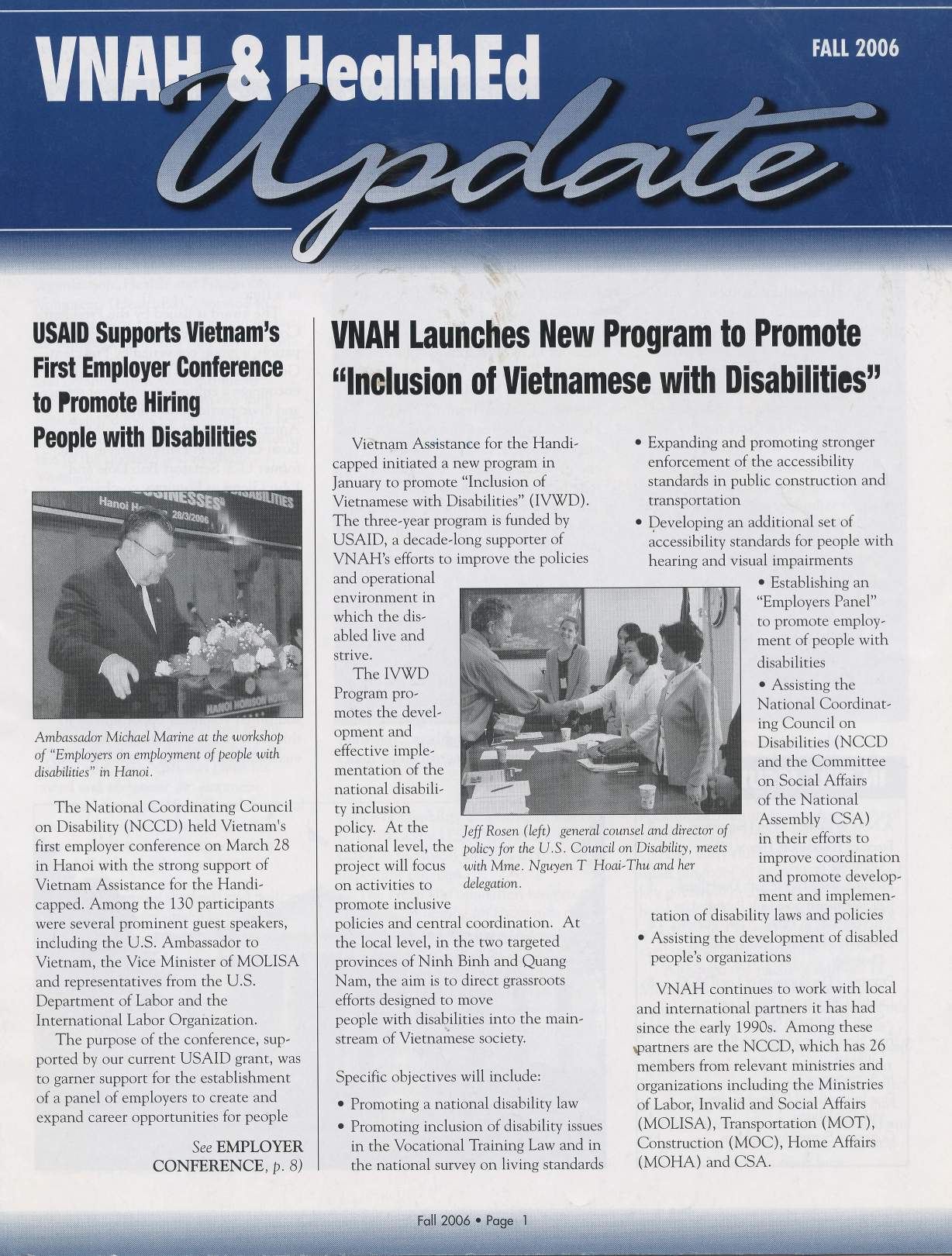
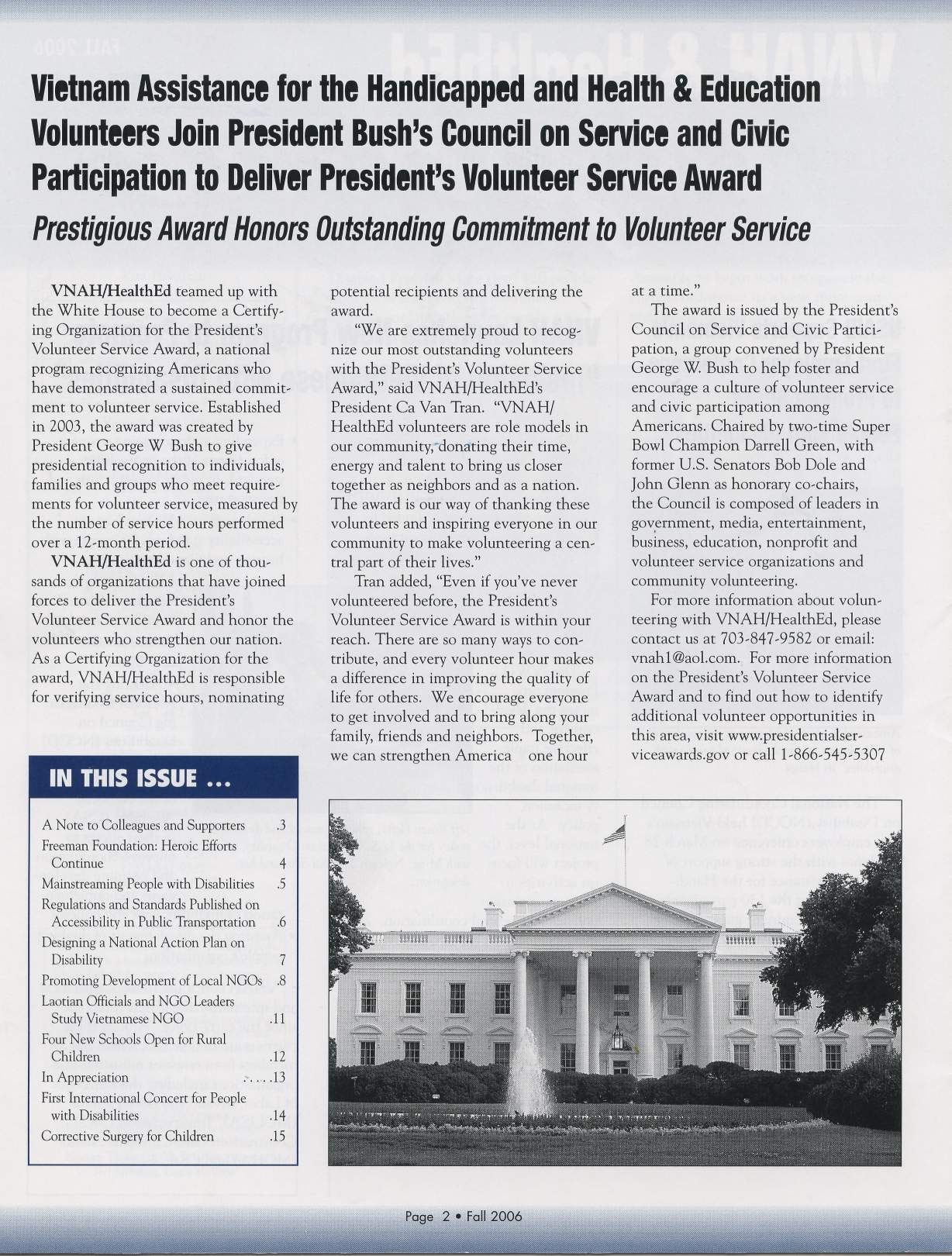
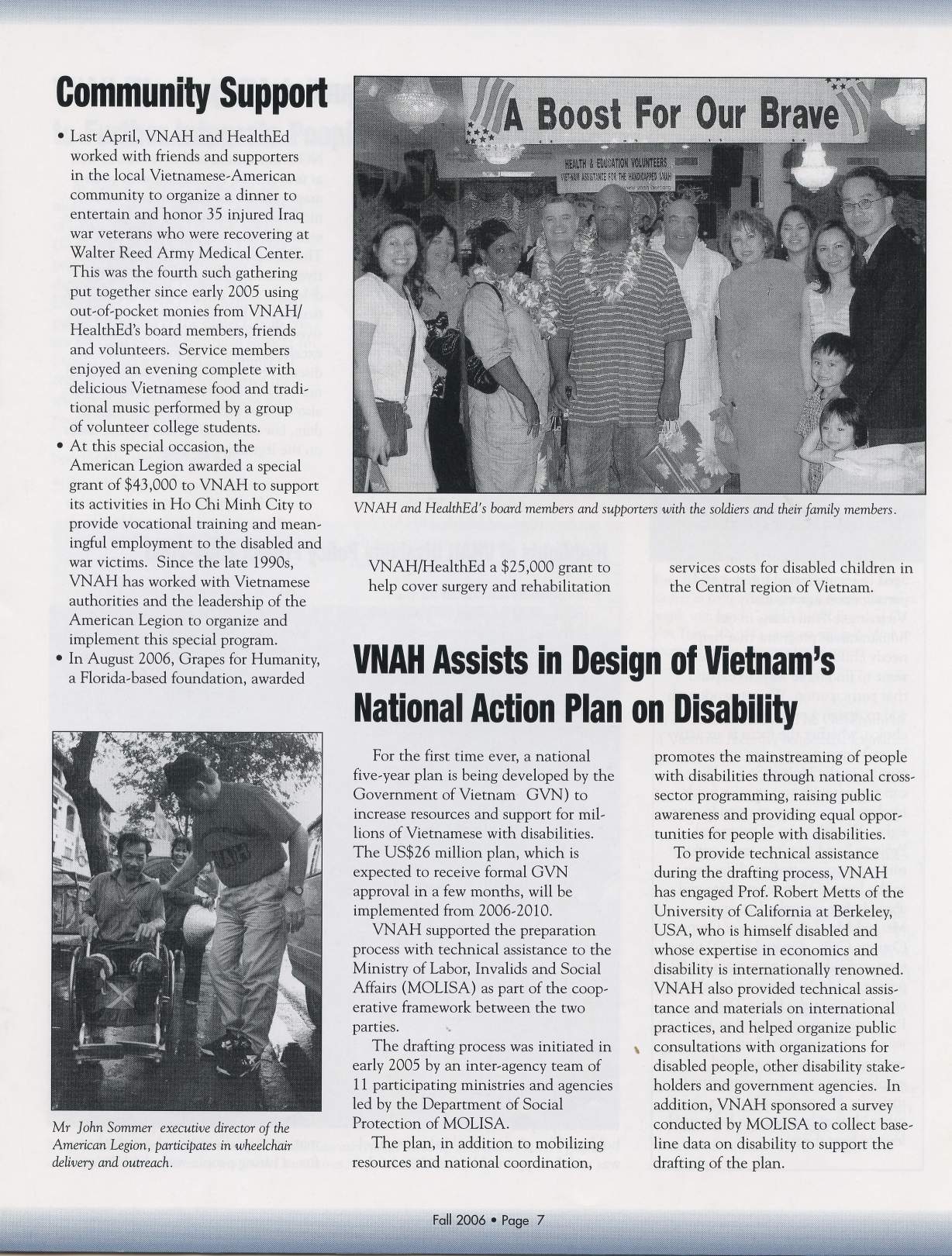
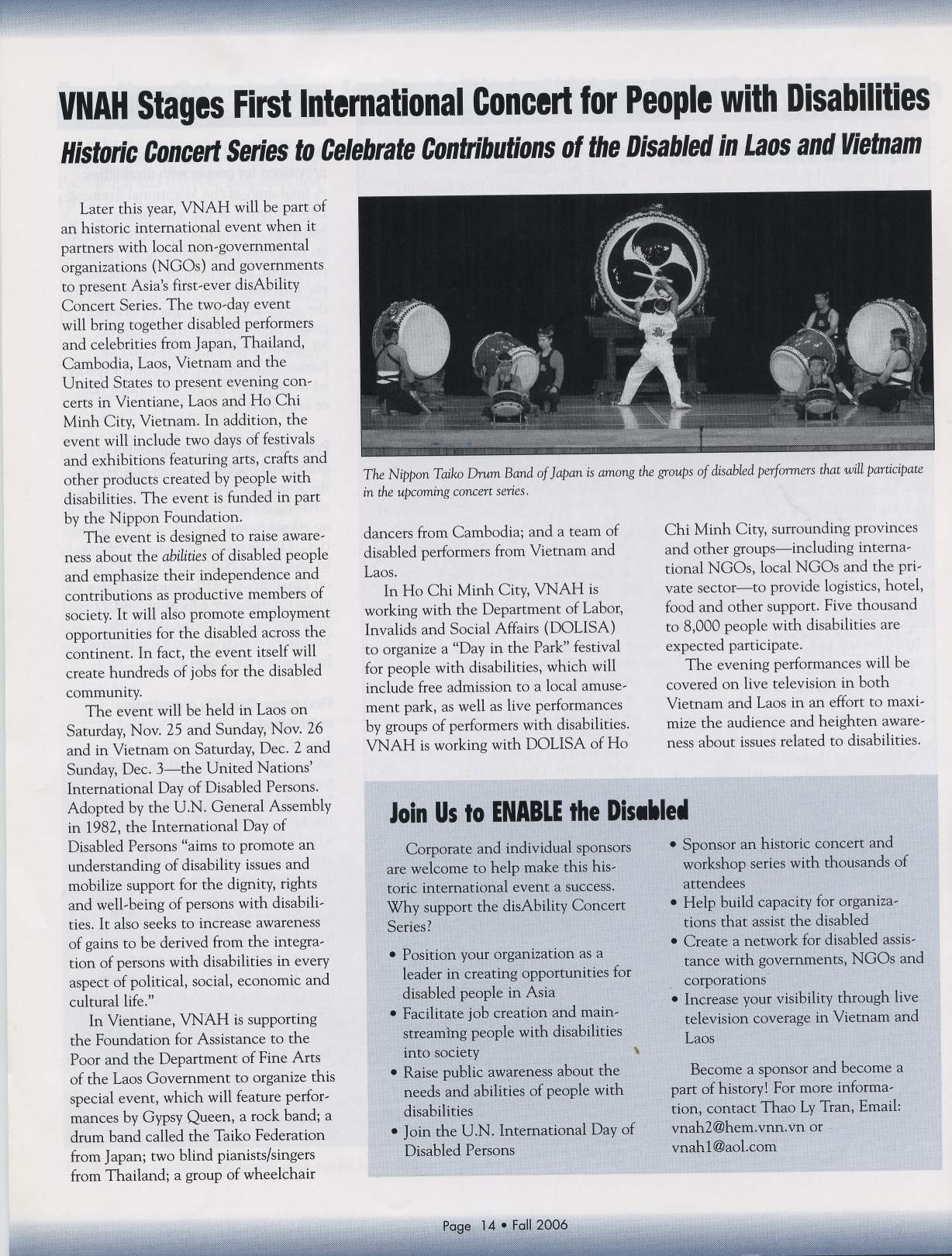
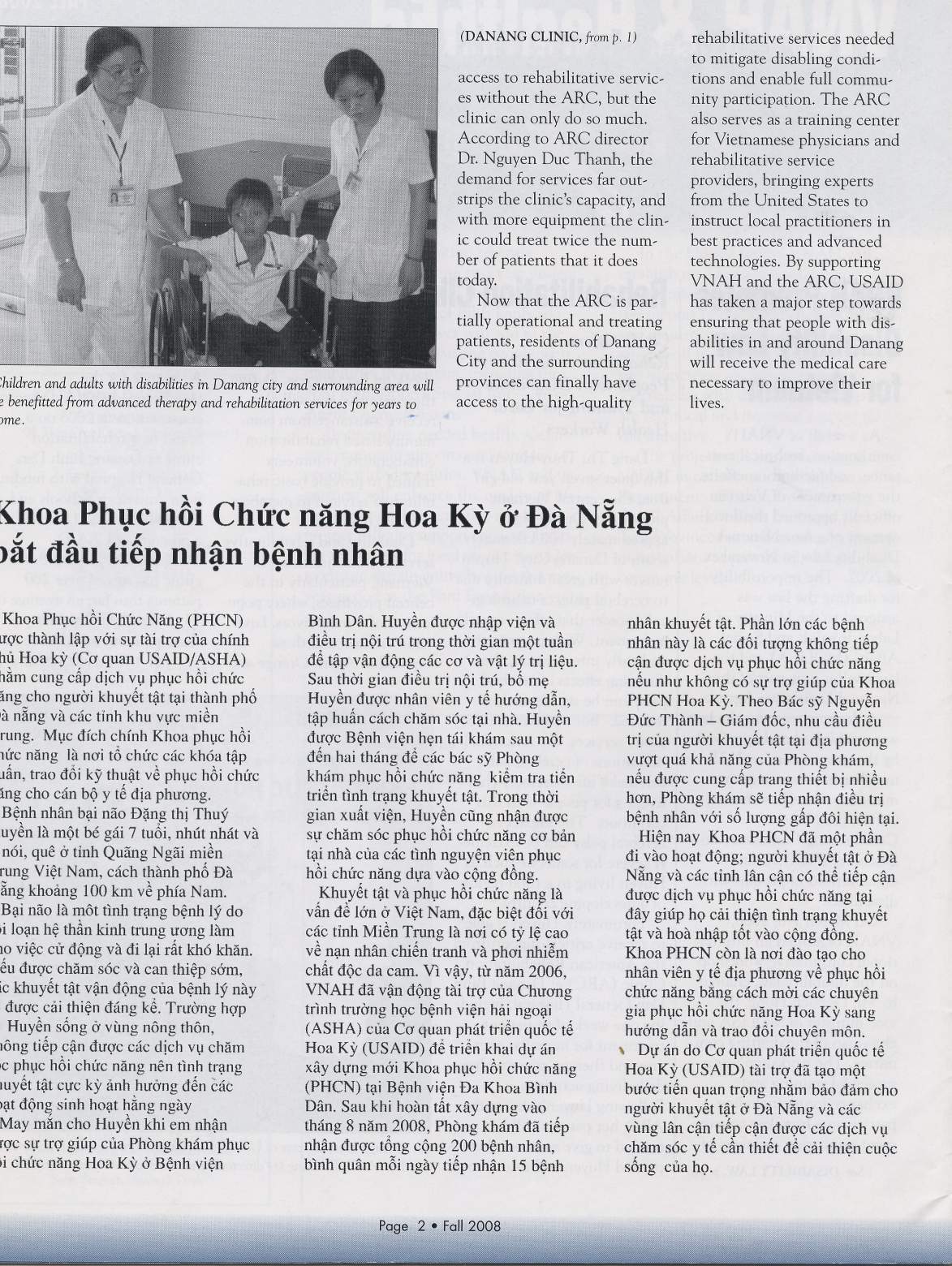
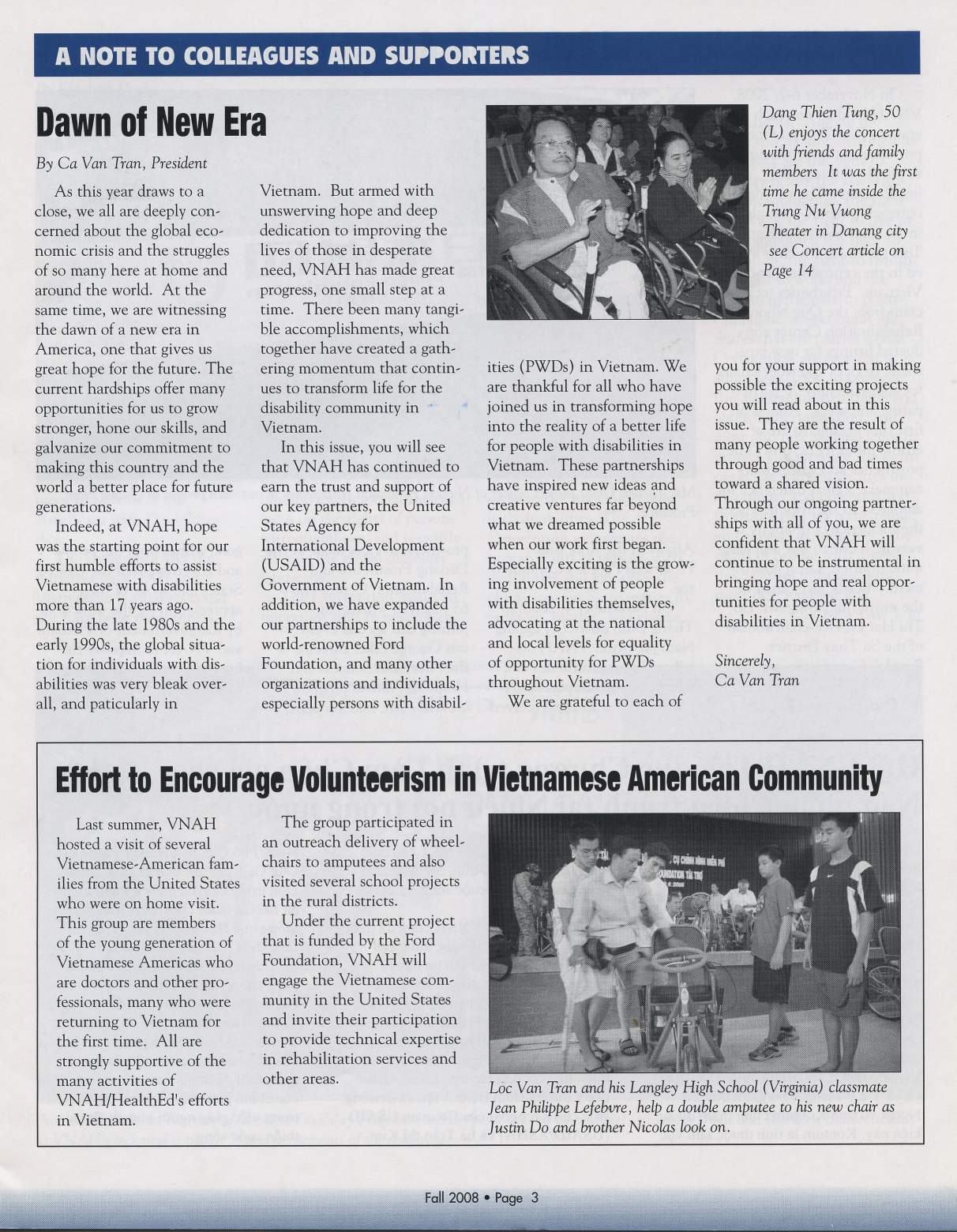
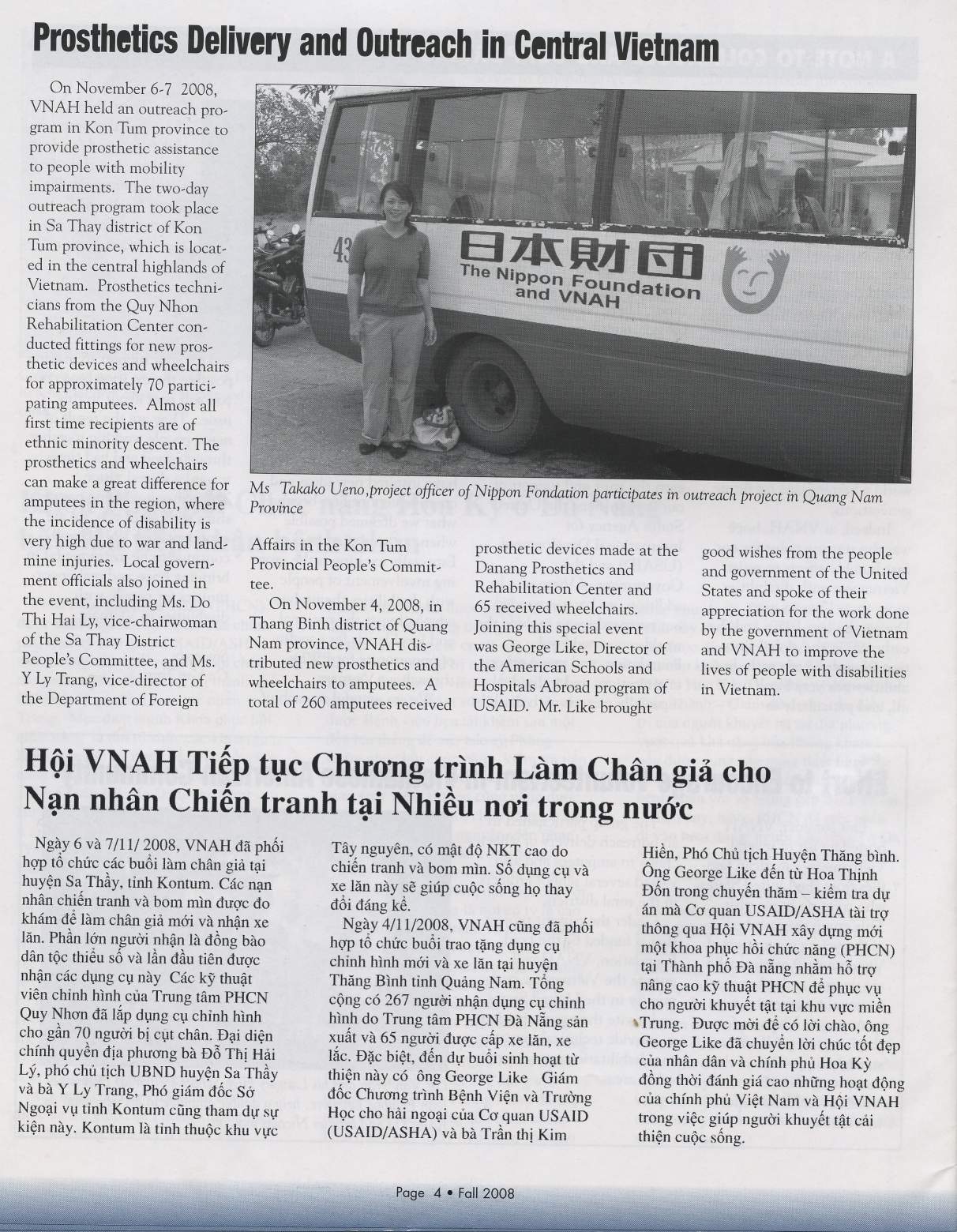
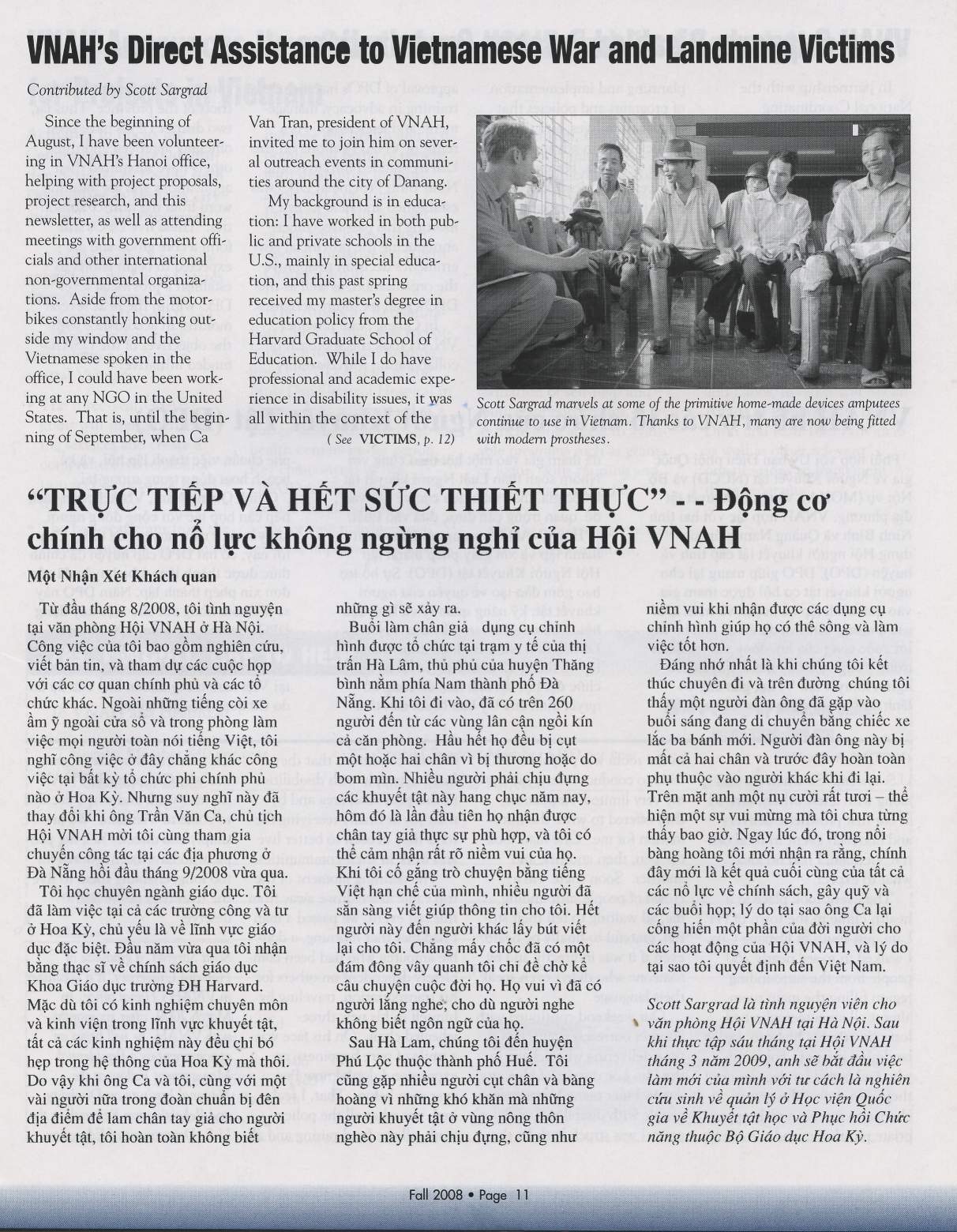
VNAH's Direct Assistance to Vietnamese War and Landmine Victims
Contributed by Scott Sargrad
Since the beginning of August, I have been volunteering in VNAH's Hanoi office, helping with project proposals, project research, and this newsletter, as well as attending meetings with government officials and other international non-governmental organizations. Aside from the motorbikes constantly honking outside my window and the Vietnamese spoken in the office, I could have been working at any NGO in the United States. That is, until the beginning of September, when Ca Van Tran, president of VNAH, invited me to join him on several outreach events in communities around the city of Danang. My background is in education: I have worked in both public and private schools in the U.S., mainly in special education, and this past spring received my master's degree in education policy from the Harvard Graduate School of Education. While I do have professional and academic experience in disability issues, it was all within the context of the U.S. Seeing firsthand the obstacles the Vietnamese people have to overcome, particularly those with disabilities, has made me more humble about the conveniences we Americans sometimes take for granted.
"See Victims, p. 12"
"TRỰC TIẾP VÀ HẾT SỨC THIẾT THỰC" - Động cơ chính cho nỗ lực không ngừng nghỉ của Hội VNAH
Một Nhận Xét Khách Quan
Từ đầu tháng 8/2008, tôi tình nguyện tại văn phòng Hội VNAH ở Hà Nội. Công việc của tôi bao gồm nghiên cứu, viết bản tin, và tham dự các cuộc họp với các cơ quan chính phủ và các tổ chức khác. Ngoài những tiếng xe máy ở ngoài cửa sổ và trong phòng làm việc mọi người toàn nói tiếng Việt, tôi nghĩ công việc ở đây chẳng khác công việc tại bất kỳ tổ chức phi chính phủ nào ở Hoa Kỳ. Nhưng tôi mới nghĩ vậy cho tới khi ông Trần Văn Ca, chủ Tịch VNAH mời cùng với ông ấy đi dự mấy cuộc công tác địa phương ở Đà Nẵng hồi đầu tháng 9/2008 vừa qua. Tôi học chuyên ngành giáo dục. Tôi đã từng day học ở các trường tư thục và công lập ở Mỹ, tập trung về giáo dục đặc biệt, và vừa nhận bằng cao học về chính sách giáo dục ở Đại học Giáo dục thuộc Đại học Havard. Tuy tôi có kinh nghiệm về các vấn đề khuyết tật, tôi hoàn toàn không hiểu những gì sẽ xảy ra.
Prosthetics Delivery and Outreach in Central Vietnam
On November 6-7, 2008, VNAH held an outreach program in Kon Tum province to provide prosthetic assistance to people with mobility impairments. The two-day outreach program took place in Sa Thay district of Kon Tum province, which is located in the central highlands of Vietnam. Prosthetics technicians from the Quy Nhon Rehabilitation Center conducted fittings for new prosthetic devices and wheelchairs for approximately 70 participating amputees. Almost all first-time recipients are of ethnic minority descent. The prosthetics and wheelchairs can make a great difference for amputees in the region, where the incidence of disability is very high due to war and landmine injuries. Local government officials also joined the event, including Ms. Do Thi Hai Ly, vice-chairwoman of the Sa Thay District People's Committee, and Ms. Ly Vy Trang, vice-director of the Department of Foreign Affairs in the Kon Tum Provincial People’s Committee.
On November 4, 2008, in Thang Binh district of Quang Nam province, VNAH distributed new prosthetics and wheelchairs to amputees. A total of 260 amputees received prosthetic devices made at the Danang Prosthetics and Rehabilitation Center and 65 received wheelchairs. Joining this special event was George Like, Director of the American Schools and Hospitals Abroad program of USAID. Mr. Like brought good wishes from the people and government of the United States and spoke of their appreciation for the work done by the government of Vietnam and VNAH to improve the lives of people with disabilities in Vietnam.
Hội VNAH Tiếp tục Chương trình Lắp Chân giả cho Nạn nhân Chiến tranh tại Nhiều nơi trong nước
Ngày 6 và 7/11/2008, VNAH đã phối hợp tổ chức các buổi lắm chân giả tại huyện Sa Thầy, tỉnh Kon Tum. Các nạn nhân chiến tranh và bom mìn được đo khám để làm chân giả mới và nhận xe lăn. Phần lớn người nhận lần đầu là đồng bào dân tộc thiểu số và là lần đầu tiên được nhận các dụng cụ này Các kỹ thuật viên chỉnh hình của Trung tâm Chỉnh hình Quy Nhơn đã đi cùng với các dụng cụ chỉnh hình và xe lăn lên tận huyện Sa Thầy để khám, đo và lắp chân giả.
A Note to Colleagues and Supporters
Dawn of New Era
By Ca Van Tran, President
As this year draws to a close, we all are deeply concerned about the global economic crisis and the struggles of so many here at home and around the world. At the same time, we are witnessing the dawn of a new era in America, one that gives us great hope for the future. The current hardships offer many opportunities for us to grow stronger, hone our skills, and galvanize our commitment to making this country and the world a better place for future generations. Indeed, at VNAH, hope was the starting point for our first humble efforts to assist Vietnamese with disabilities more than 17 years ago. During the late 1980s and the early 1990s, the global situation for individuals with disabilities was very bleak overall, and particularly in Vietnam. But armed with unswerving hope and deep dedication to improving the lives of those in desperate need, VNAH has made great progress, one small step at a time. There have been many tangible accomplishments, which together have created a gathering momentum that continues to transform life for the disability community in Vietnam.
Effort to Encourage Volunteerism in Vietnamese American Community
Last summer, VNAH hosted a visit of several Vietnamese-American families from the United States who were on home visit. This group are members of the younger generation of Vietnamese Americans who are doctors and other professionals, many who were returning to Vietnam for the first time. All are strongly supportive of the many activities of VNAH/HealthEd's efforts in Vietnam. The group participated in an outreach delivery of wheelchairs to amputees and also visited several school projects in the rural districts.
Under the current project that is funded by the Ford Foundation, VNAH will engage the Vietnamese community in the United States and invite their participation to provide technical expertise in rehabilitation services and other areas.
Loc Van Tran and his Langley High School (Virginia) classmate Jean Philippe Lefebvre, help a double amputee to his new chair as Justin Do and brother Nicolas look on.
VNAH Stages First International Concert for People with Disabilities
Historic Concert Series to Celebrate Contributions of the Disabled in Laos and Vietnam
Later this year, VNAH will be part of an historic international event when it partners with local non-governmental organizations (NGOs) and governments to present Asia’s first-ever disAbility Concert Series. The two-day event will bring together disabled performers and celebrities from Japan, Thailand, Cambodia, Laos, Vietnam and the United States to present evening concerts in Vientiane, Laos and Ho Chi Minh City, Vietnam. In addition, the event will include two days of festivals and exhibitions featuring arts, crafts and other products created by people with disabilities. The event is funded in part by the Nippon Foundation.
The event is designed to raise awareness about the abilities of disabled people and emphasize their independence and contributions as productive members of society. It will also promote employment opportunities for the disabled across the continent. In fact, the event itself will create hundreds of jobs for the disabled community. The event will be held in Laos on Saturday, Nov. 25 and Sunday, Nov. 26 and in Vietnam on Saturday, Dec. 2 and Sunday, Dec. 3—the United Nations’ International Day of Disabled Persons. Adopted by the U.N. General Assembly in 1982, the International Day of Disabled Persons “aims to promote an understanding of disability issues and mobilize support for the dignity, rights and well-being of persons with disabilities. It also seeks to increase awareness of gains to be derived from the integration of persons with disabilities in every aspect of political, social, economic and cultural life.”
In Vientiane, VNAH is supporting the Foundation for Assistance to the Poor and the Department of Fine Arts of the Laos Government to organize this special event, which will feature performances by Gypsy Queen, a rock band; a drum band called the Taiko Federation from Japan; two blind pianists/singers from Thailand; a group of wheelchair dancers from Cambodia; and a team of disabled performers from Vietnam and Laos.
In Ho Chi Minh City, VNAH is working with the Department of Labor, Invalids and Social Affairs (DOLISA) to organize a “Day in the Park” festival for people with disabilities, which will include free admission to a local amusement park, as well as live performances by groups of performers with disabilities. VNAH is working with DOLISA of Ho Chi Minh City, surrounding provinces and other groups—including international NGOs, local NGOs and the private sector—to provide logistics, hotel, and other support. Five thousand to 8,000 people with disabilities are expected participate. The evening performances will be covered on live television in both Vietnam and Laos in an effort to maximize the audience and heighten awareness about issues related to disabilities.
Join us to ENABLE the Disabled
Corporate and individual sponsors are welcome to help make this historic international event a success.
Why support the disAbility Concert Series?
- Position your organization as a leader in creating opportunities for disabled people in Asia
- Facilitate job creation and mainstreaming people with disabilities into society
- Raise public awareness about the needs and abilities of people with disabilities
- Sponsor an historic concert and workshop series with thousands of attendees
- Help build capacity for organizations that assist the disabled
- Create a network for disabled assistance that extends across nations
- Increase your visibility through live television coverage in Vietnam and Laos
- Join the U.N. International Day of Disabled Persons
Become a sponsor and become a part of history! For more information, contact Thao Ly Tran, Email: vnah2@then.vnn.vn or vnah1@aol.com
The Nippon Taiko Drum Band of Japan is among the groups of disabled performers that will participate in the upcoming concert series.
Community Support
Last April, VNAH and HealthEd worked with friends and supporters in the local Vietnamese-American community to organize a dinner to entertain and honor 35 injured Iraq war veterans who were recovering at Walter Reed Army Medical Center. This was the fourth such gathering put together since early 2005 using out-of-pocket monies from VNAH/HealthEd's board members, friends and volunteers. Service members enjoyed an evening complete with delicious Vietnamese food and traditional music performed by a group of volunteer college students.
At this special occasion, the American Legion awarded a special grant of $43,000 to VNAH to support its activities in Ho Chi Minh City to provide vocational training and meaningful employment to the disabled and war victims. Since the late 1990s, VNAH has worked with Vietnamese authorities and the leadership of the American Legion to organize and implement this special program.
In August 2006, Grapes for Humanity, a Florida-based foundation, awarded VNAH/HealthEd a $25,000 grant to help cover surgery and rehabilitation services costs for disabled children in the Central region of Vietnam.
VNAH and HealthEd board members and supporters with the soldiers and their family members.
VNAH Assists in Design of Vietnam’s National Action Plan on Disability
For the first time ever, a national five-year plan is being developed by the Government of Vietnam (GVN) to increase resources and support for millions of Vietnamese with disabilities. The US$26 million plan, which is expected to receive formal GVN approval in a few months, will be implemented from 2006-2010.
VNAH supported the preparation process with technical assistance to the Ministry of Labor, Invalids and Social Affairs (MOLISA) as part of the cooperative framework between the two parties. The drafting process was initiated in early 2005 by an inter-agency team of 11 participating ministries and agencies led by the Department of Social Protection of MOLISA.
The plan, in addition to mobilizing resources and national coordination, promotes the mainstreaming of people with disabilities through national cross-sector programming, raising public awareness and providing equal opportunities for people with disabilities. To provide technical assistance during the drafting process, VNAH has engaged Prof. Robert Metts of the University of California at Berkeley, USA, who is himself disabled and whose expertise in economics and disability is internationally renowned. VNAH also provided technical assistance and materials on international practices, and helped organize public consultations with stakeholders, including people with disabilities themselves. The inter-agency task force conducted a survey in each province to collect baseline information and support for the drafting of the plan.
Mr. John Sommer, executive director of the American Legion, participates in wheelchair delivery and outreach.
Vietnam Assistance for the Handicapped and Health & Education Volunteers Join President Bush’s Council on Service and Civic Participation to Deliver President’s Volunteer Service Award
Prestigious Award Honors Outstanding Commitment to Volunteer Service
VNAH/HealthEd teamed up with the White House to become a Certifying Organization for the President’s Volunteer Service Award, a national program recognizing Americans who have demonstrated a sustained commitment to volunteer service. Established in 2003, the award was created by President George W. Bush to give presidential recognition to individuals, families, and groups who meet requirements for volunteer service, measured by the number of service hours performed over a 12-month period.
VNAH/HealthEd is one of thousands of organizations that have joined forces to deliver the President’s Volunteer Service Award and honor the volunteers who strengthen our nation. As a Certifying Organization for the award, VNAH/HealthEd is responsible for verifying service hours, nominating potential recipients and delivering the award.
“We are extremely proud to recognize our most outstanding volunteers with the President’s Volunteer Service Award,” said VNAH/HealthEd’s President Ca Van Tran. “VNAH/HealthEd volunteers are role models in our community, donating their time, energy and talent to bring us closer together as neighbors and as a nation. The award is our way of thanking these volunteers and inspiring everyone in our community to make volunteering a central part of their lives.”
Tran added, “Even if you’ve never volunteered before, the President’s Volunteer Service Award is within your reach. There are so many ways to contribute, and every volunteer hour makes a difference in improving the quality of life for others. We encourage everyone to get involved and to bring along your family, friends, and neighbors. Together, we can strengthen America one hour at a time.”
The award is issued by the President’s Council on Service and Civic Participation, a group convened by President George W. Bush to help foster and encourage a culture of volunteer service and civic participation among Americans. Chaired by three-time Super Bowl Champion Darrell Green, with former U.S. Senators Bob Dole and John Glenn as honorary co-chairs, the Council is composed of leaders in government, media, entertainment, business, education, nonprofit, and volunteer service organizations and represents millions of volunteers who are helping to renew America through service.
For more information on the President’s Volunteer Service Award and to find out how to identify additional volunteer opportunities in this area, visit www.presidentialserviceawards.gov or call 1-866-545-5307.
VNAH & HealthEd Update
Fall 2006
USAID Supports Vietnam’s First Employer Conference to Promote Hiring People with Disabilities
The National Coordinating Council on Disability (NCCD) held Vietnam’s first employer conference on March 28 in Hanoi with the strong support of Vietnam Assistance for the Handicapped. Among the 130 participants were several prominent guest speakers, including the U.S. Ambassador to Vietnam, the Vice Minister of MOLISA, and representatives from the U.S. Department of Labor and the International Labor Organization.
The purpose of the conference, supported by our current USAID grant, was to garner support for the establishment of a panel of employers to create and expand career opportunities for people with disabilities, as well as to strengthen the implementation of policies facilitating their inclusion in the Vietnamese workforce.
VNAH Launches New Program to Promote “Inclusion of Vietnamese with Disabilities”
Vietnam Assistance for the Handicapped initiated a new program in January to promote “Inclusion of Vietnamese with Disabilities” (IVWD). The three-year program is funded by USAID, a decade-long supporter of VNAH’s efforts to improve the policies and operational environment in which the disabled live and strive.
The IVWD Program promotes the development and effective implementation of the national disability inclusion policy. At the national level, the project will focus on activities to promote inclusive policies and central coordination. At the local level, in the two targeted provinces of Ninh Binh and Quang Nam, the aim is to direct grassroots efforts designed to move people with disabilities into the mainstream of Vietnamese society.
Specific objectives will include:
- Promoting a national disability law
- Promoting inclusion of disability issues in the Vocational Training Law and in the national survey on living standards
- Expanding and promoting stronger enforcement of the accessibility standards



